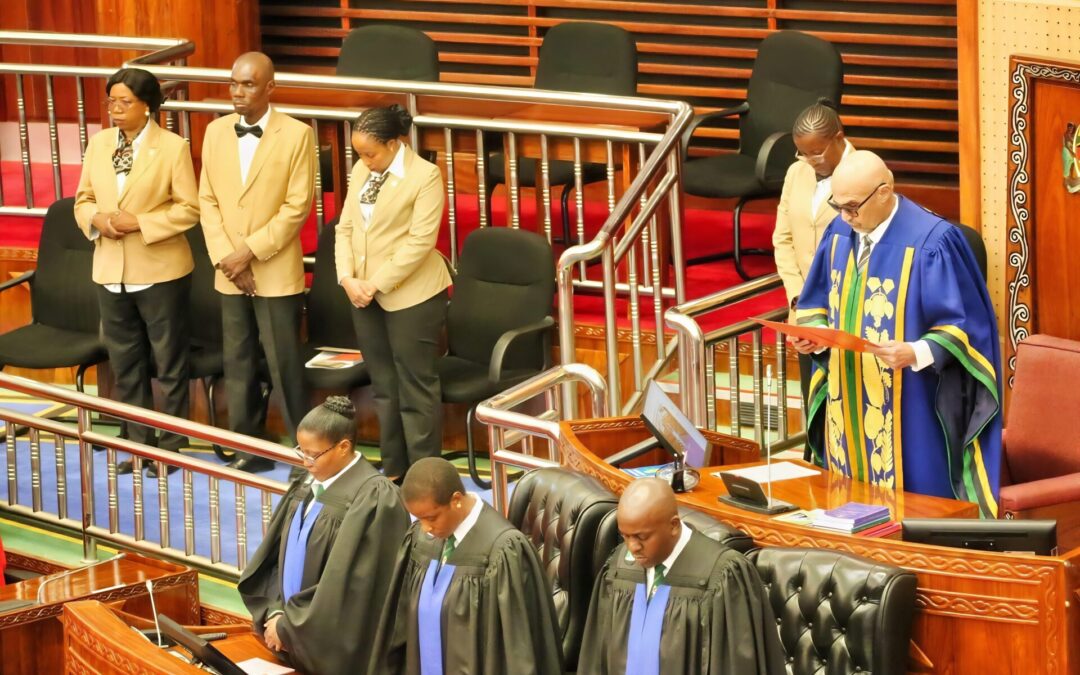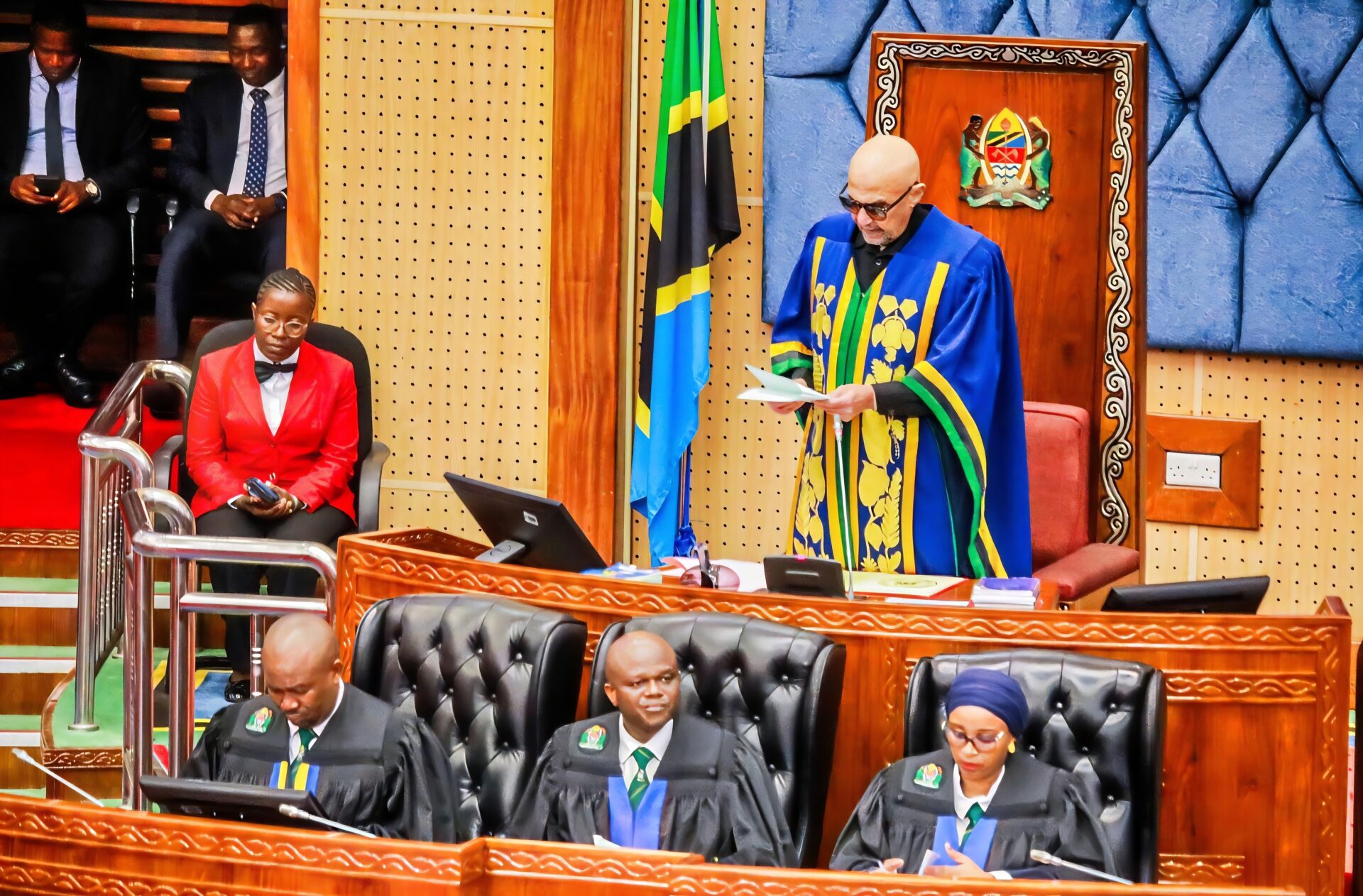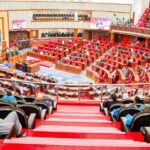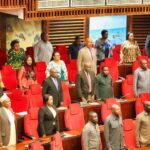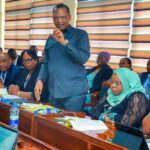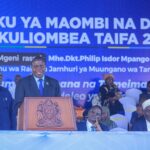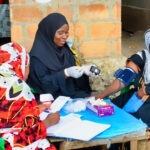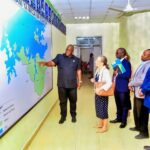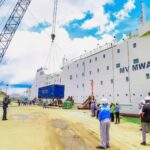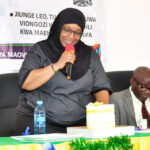Exploring Tanzania’s Landmark Legislative Reforms of April 2025: A Pathway to Sustainable Growth and Development
On 8 April 2025, the Tanzanian Parliament passed seven transformative bills aimed at addressing critical challenges across infrastructure, healthcare, education, youth employment, and environmental sustainability. These landmark reforms, discussed extensively during the parliamentary session, underscore the government’s commitment to fostering inclusive growth, eradicating poverty, and achieving middle-income status by 2050 under Tanzania’s Vision 2050. From upgrading roads like the Mlowo–Isansa–Magamba Road in Songwe District to expanding healthcare facilities such as the Funvuhu Hospital Maternity Wing, these initiatives promise to uplift rural communities, empower youth entrepreneurship, and promote eco-friendly development. In Zanzibar, where tourism and agriculture remain vital, targeted investments aim to balance cultural preservation with modernisation. As stakeholders collaborate to implement these reforms, questions arise about bureaucratic delays, funding gaps, and regional priorities. This article delves into the implications of these legislative milestones, exploring how technology, transparency, and public participation will shape their success—and ultimately determine Tanzania’s trajectory toward a brighter, more equitable future.
-
Introduction to the Seven Bills: A Bold Step Towards Tanzania’s Socio-Economic Transformation
In a landmark session of the Tanzanian Parliament on 8 April 2025, seven significant bills were passed, marking a pivotal moment in the nation’s legislative history. These bills, which span a wide array of sectors, reflect the government’s unwavering commitment to addressing critical national challenges while fostering sustainable development. Together, they form a comprehensive framework aimed at advancing Tanzania’s socio-economic agenda and improving the quality of life for its citizens. Below is an overview of the seven bills, their primary objectives, and their collective role in shaping the future of Tanzania.
1. The Written Laws (Miscellaneous Amendments) Bill, 2024
This bill introduces a series of amendments to existing laws, streamlining legal frameworks to enhance efficiency and accountability across various sectors. Its primary objective is to modernise outdated regulations, ensuring they align with contemporary needs and global standards. For instance, it addresses gaps in labour laws, environmental management, and public service delivery, creating a more conducive environment for governance and economic growth.
2. The Tanzania Broadcasting Corporation Bill, 2024
The Tanzania Broadcasting Corporation (TBC) Bill seeks to restructure and empower TBC as a public broadcaster. Its primary objective is to ensure that TBC operates independently while adhering to high journalistic standards. The bill also aims to expand access to information and promote cultural preservation through media. This is particularly significant in Zanzibar, where local broadcasting plays a vital role in preserving the archipelago’s unique heritage.
3. The Labour Laws Amendment Bill, 2024
This bill focuses on enhancing workers’ rights and improving labour conditions across Tanzania. Key provisions include fair wage policies, improved workplace safety measures, and stronger protections for vulnerable groups such as women and persons with disabilities. By addressing these issues, the bill seeks to create a more equitable labour market, which is essential for reducing poverty and fostering social cohesion.
4. The Environmental Management Amendment Bill, 2024
As climate change continues to pose a significant threat to Tanzania’s ecosystems, this bill introduces stricter environmental regulations. It promotes sustainable practices such as reforestation, waste management, and pollution control. Additionally, it incentivises green investments and supports community-led conservation initiatives. In Zanzibar, where tourism heavily relies on pristine beaches and coral reefs, this bill is crucial for safeguarding natural resources.
5. The Special Economic Zones Investment Bill, 2024
This bill establishes a robust framework for developing Special Economic Zones (SEZs) across Tanzania. SEZs are designed to attract foreign direct investment (FDI) by offering business-friendly environments, including tax incentives and streamlined regulatory processes. By creating hubs for industrial growth, the bill aims to boost employment opportunities and stimulate regional economies. For example, SEZs in Zanzibar could revitalise industries like spice production and handicrafts, leveraging the island’s unique advantages.
6. The Supplementary Appropriation for the Financial Year 2024/2025
This bill allocates additional funding to support priority projects within the ongoing fiscal year. Key areas of focus include infrastructure development, healthcare, education, and rural electrification. The supplementary budget underscores the government’s commitment to addressing urgent needs while maintaining fiscal discipline. In regions like Zanzibar, where connectivity remains a challenge, these funds will be instrumental in bridging infrastructure gaps.
7. The Freedom of Information Act Implementation Framework
While not explicitly named among the seven bills, discussions during the parliamentary session highlighted the importance of ethical journalism and freedom of information. The government has committed to strengthening media oversight through the establishment of an Editors’ Ethics Board. This initiative ensures that journalists operate responsibly while upholding press freedom—a cornerstone of democracy in both mainland Tanzania and Zanzibar.
Collective Role in Advancing Tanzania’s Socio-Economic Agenda
Collectively, these bills represent a holistic approach to tackling some of Tanzania’s most pressing challenges. They address key pillars of development, including economic growth, environmental sustainability, social equity, and good governance. For instance:
- Economic Growth: By promoting investment through SEZs and modernising labour laws, the bills aim to create jobs and diversify the economy.
- Environmental Sustainability: Stricter environmental regulations will help mitigate the impacts of climate change, protecting Tanzania’s rich biodiversity.
- Social Equity: Enhanced labour protections and targeted investments in underserved regions will reduce inequality and improve living standards.
- Good Governance: Reforms in broadcasting and information dissemination foster transparency and accountability, strengthening democratic institutions.
In Zanzibar, these reforms hold particular promise for unlocking the region’s potential. From boosting tourism through environmental conservation to revitalising local industries via SEZs, the bills offer tailored solutions to the archipelago’s unique challenges.
The passage of these seven bills signals a new era of progress and accountability in Tanzania. By addressing critical issues ranging from labour rights to environmental protection, they lay the groundwork for a more prosperous and inclusive society. As implementation begins, all stakeholders—government, private sector, and citizens alike—must work collaboratively to ensure that these legislative milestones translate into tangible benefits for the people of Tanzania and Zanzibar.
-
The Environmental Management Amendment Bill: A Step Towards Sustainable Development in Tanzania and Zanzibar
The Environmental Management Amendment Bill, one of the seven landmark bills passed by the Tanzanian Parliament on 8 April 2025 , represents a bold and necessary step towards addressing some of the most pressing environmental challenges facing the nation. With climate change, deforestation, and pollution posing significant threats to both mainland Tanzania and the semi-autonomous region of Zanzibar, this bill introduces stricter regulations while incentivising green practices. Its overarching goal is to create a sustainable framework for environmental stewardship that balances economic growth with ecological preservation.
Addressing Climate Change
Climate change has become an existential threat to Tanzania, with rising temperatures, erratic rainfall patterns, and extreme weather events increasingly disrupting livelihoods. For instance, coastal regions like Zanzibar are particularly vulnerable to rising sea levels, which threaten tourism infrastructure, fisheries, and agricultural land. Similarly, mainland Tanzania faces challenges such as prolonged droughts in Arusha and Kilimanjaro, which impact water resources and food security.
To combat these issues, the Environmental Management Amendment Bill proposes several measures:
- Strengthening Climate Adaptation Policies
The bill mandates local governments to develop and implement climate adaptation strategies tailored to their specific needs. For example, Zanzibar’s coral reefs, mangroves, and beaches—vital for its tourism industry—will benefit from targeted conservation efforts. - Promoting Renewable Energy Projects
Recognising the importance of reducing carbon emissions, the bill encourages investment in renewable energy sources such as solar, wind, and geothermal power. Regions like Dodoma and Singida, known for their abundant sunlight and wind potential, stand to gain significantly from these initiatives. - Enhancing Disaster Preparedness
By requiring early warning systems and emergency response plans, the bill seeks to mitigate the impacts of natural disasters exacerbated by climate change. This is especially relevant for flood-prone areas like Morogoro and Lindi, where heavy rains often lead to widespread destruction.
Combating Deforestation
Deforestation remains a critical issue in Tanzania, driven by illegal logging, agricultural expansion, and charcoal production. According to recent studies, Tanzania loses approximately 400,000 hectares of forest annually—a trend that not only accelerates climate change but also disrupts biodiversity and reduces soil fertility.
The bill addresses deforestation through the following mechanisms:
- Stricter Penalties for Illegal Logging
The legislation imposes harsher fines and penalties for individuals or companies engaging in unauthorised logging activities. These measures aim to deter illicit practices while ensuring accountability across all levels of governance. - Reforestation Initiatives
To counteract decades of deforestation, the bill promotes large-scale tree planting campaigns. In Zanzibar, reforestation projects will focus on restoring degraded mangrove forests, which play a crucial role in coastal protection and marine ecosystem health. Meanwhile, mainland initiatives will prioritise key watersheds such as those surrounding Mount Kilimanjaro and Lake Victoria, safeguarding vital water supplies. - Incentivising Sustainable Agriculture
The bill supports agroforestry—the integration of trees into farmland—as a means of enhancing productivity while preserving forests. Farmers in regions like Iringa and Mbeya will receive training and subsidies to adopt sustainable farming techniques that reduce pressure on existing woodlands.
Tackling Pollution
Pollution poses another major challenge to Tanzania’s environment, with urban centres like Dar es Salaam grappling with high levels of air and water contamination. Industrial waste, plastic pollution, and inadequate waste management systems have led to deteriorating public health outcomes and environmental degradation.
To tackle this issue comprehensively, the bill introduces several innovative solutions:
- Banning Single-Use Plastics
Building on previous efforts to curb plastic pollution, the bill enforces a nationwide ban on single-use plastics. This measure aligns with global best practices and aims to protect Tanzania’s pristine landscapes and marine ecosystems. - Improving Waste Management Infrastructure
The bill allocates funds for upgrading waste collection and recycling facilities, particularly in densely populated areas. In Zanzibar, improved waste management will help preserve the archipelago’s idyllic beaches, making them more attractive to tourists. - Regulating Industrial Emissions
Stricter emission standards will be imposed on industries operating in Tanzania, ensuring compliance with international environmental norms. Factories in Mtwara and Kigoma, for example, will be required to invest in cleaner technologies to minimise their ecological footprint.
Incentivising Green Practices
Beyond regulation, the bill places great emphasis on encouraging behavioural change among citizens and businesses alike. Key incentives include:
- Tax Breaks for Eco-Friendly Businesses
Companies adopting sustainable practices, such as using renewable energy or reducing waste, will qualify for tax breaks and grants. This approach is expected to attract environmentally conscious investors to Special Economic Zones (SEZs), including those planned for Zanzibar. - Community-Led Conservation Programmes
Local communities will be empowered to take ownership of conservation efforts through participatory programmes. For instance, villagers in Tabora and Shinyanga will collaborate with government agencies to manage protected forests and wildlife reserves, fostering a sense of shared responsibility. - Education and Awareness Campaigns
The bill allocates resources for nationwide campaigns aimed at educating Tanzanians about the importance of environmental conservation. Schools in Zanzibar, for example, will incorporate lessons on sustainability into their curricula, nurturing environmentally aware future generations.
Implications for Zanzibar
While the bill applies to the entire United Republic of Tanzania, its provisions hold particular significance for Zanzibar due to the region’s unique geography and economy. As a popular tourist destination, Zanzibar relies heavily on its natural beauty—from powdery white sands to lush spice plantations. However, unchecked development and poor waste management threaten to undermine these assets.
By implementing stricter environmental regulations and promoting green practices, the bill seeks to ensure that Zanzibar’s tourism sector remains resilient and sustainable. Additionally, protecting the islands’ fragile ecosystems will safeguard livelihoods dependent on fishing and agriculture, thereby contributing to long-term economic stability.
The Environmental Management Amendment Bill marks a pivotal moment in Tanzania’s journey towards sustainable development. By addressing climate change, combating deforestation, and tackling pollution, it lays the groundwork for a greener, more equitable future. For mainland Tanzania and Zanzibar alike, this legislation underscores the importance of balancing progress with preservation—a principle essential for securing the well-being of present and future generations.
As implementation begins, all stakeholders must work collaboratively to translate these ambitious policies into tangible results. Only then can Tanzania truly harness its rich natural heritage to build a brighter tomorrow.
- Strengthening Climate Adaptation Policies
-
Labour Laws Amendment Bill: Strengthening Workers’ Rights and Workplace Safety in Tanzania and Zanzibar
The Labour Laws Amendment Bill, one of the seven landmark bills passed by the Tanzanian Parliament on 8 April 2025, represents a significant step forward in safeguarding workers’ rights, promoting fair wages, and enhancing workplace safety across industries. This legislative reform aligns with Tanzania’s commitment to fostering equitable economic growth while addressing long-standing challenges faced by workers in both mainland Tanzania and the semi-autonomous region of Zanzibar. Below is an in-depth analysis of how the updated labour laws aim to achieve these objectives.
Improving Workers’ Rights
The amended labour laws introduce robust measures to protect workers’ rights, ensuring that employees are treated fairly and with dignity. Key provisions include:
- Enhanced Protections for Vulnerable Groups
The bill places special emphasis on protecting vulnerable groups such as women, youth, and persons with disabilities. For example, it mandates equal pay for equal work, prohibits gender-based discrimination, and ensures reasonable accommodations for disabled workers. In Zanzibar, where tourism and agriculture are major employers, these protections will benefit women working in hotels and farms, who often face exploitation due to informal employment arrangements. - Strengthened Collective Bargaining Rights
The bill reinforces the right of workers to form and join trade unions, empowering them to negotiate better terms of employment. By strengthening collective bargaining frameworks, the legislation aims to reduce power imbalances between employers and employees. This is particularly relevant in sectors like mining and manufacturing, where workers have historically struggled to secure fair agreements. - Job Security and Anti-Retaliation Measures
To curb exploitative practices such as arbitrary dismissals, the bill introduces stricter guidelines for terminating employment contracts. Employers must provide valid reasons for layoffs and offer severance packages where applicable. Additionally, the law prohibits retaliation against workers who report violations or advocate for their rights.
Promoting Fair Wages
Fair wages are a cornerstone of the amended labour laws, reflecting the government’s commitment to reducing income inequality and improving living standards. Key initiatives include:
- Establishment of a National Minimum Wage Framework
The bill mandates the creation of a national minimum wage policy tailored to different regions and sectors. While mainland Tanzania and Zanzibar may have varying thresholds based on local economic conditions, the overarching goal is to ensure that all workers earn enough to meet basic needs such as food, housing, and education. For instance, agricultural workers in Zanzibar’s clove and spice farms will benefit from guaranteed minimum wages, reducing poverty among rural communities. - Regular Wage Reviews
To keep pace with inflation and rising living costs, the bill requires periodic reviews of wage structures. These reviews will involve consultations with stakeholders, including employers, trade unions, and government agencies. By maintaining transparency and accountability, the process aims to prevent stagnation in real wages—a common issue in low-income industries. - Incentives for Decent Work Practices
The bill encourages businesses to adopt decent work practices by offering tax incentives to companies that comply with fair wage policies. This approach not only benefits workers but also promotes sustainable business growth. For example, small enterprises in Zanzibar’s hospitality sector could qualify for reduced taxes if they demonstrate adherence to ethical employment standards.
Enhancing Workplace Safety
Workplace safety is another critical focus of the Labour Laws Amendment Bill, addressing concerns about hazardous working environments and inadequate health protections. The bill introduces comprehensive reforms to mitigate risks and improve occupational health outcomes.
- Stricter Safety Regulations
The bill mandates employers to implement rigorous safety protocols, particularly in high-risk industries such as construction, mining, and manufacturing. For example, companies operating in Tanzania’s gold-rich regions like Geita and Shinyanga must now conduct regular risk assessments and provide personal protective equipment (PPE) to workers. Similarly, in Zanzibar’s marine fisheries, boat operators are required to adhere to safety standards to prevent accidents at sea. - Increased Penalties for Non-Compliance
To deter negligence, the bill imposes harsher penalties for violations of workplace safety regulations. Employers found guilty of endangering workers’ lives face hefty fines, suspension of operations, or even imprisonment. This measure is expected to hold corporations accountable and encourage proactive compliance. - Worker Training and Awareness Campaigns
Recognising the importance of education, the bill allocates resources for training programs aimed at raising awareness about workplace hazards and safety procedures. In Zanzibar, workshops targeting fishermen, farmers, and artisans will equip them with skills to identify and mitigate risks effectively. - Improved Healthcare Access for Workers
The bill also seeks to enhance healthcare access for injured or ill workers. For instance, it expands coverage under the National Health Insurance Fund (NHIF), ensuring that workers receive timely medical treatment without financial strain. This is especially beneficial for those employed in remote areas, such as plantation workers in Tanga or quarry miners in Dodoma.
Addressing Challenges Specific to Zanzibar
While the amended labour laws apply nationwide, certain provisions are particularly pertinent to Zanzibar’s unique socio-economic context. As a key player in Tanzania’s tourism industry, Zanzibar faces distinct challenges related to seasonal employment, informal labour, and reliance on foreign investment.
- Regulating Informal Employment
A significant portion of Zanzibar’s workforce operates in the informal sector, including street vendors, tour guides, and freelance artisans. The bill seeks to formalise these jobs by requiring employers—even small-scale operators—to register their workers and adhere to basic labour standards. - Supporting Small Businesses
Recognising the role of small businesses in driving Zanzibar’s economy, the bill provides technical assistance and capacity-building support to micro-enterprises. This enables them to comply with labour regulations without overburdening their limited resources. - Boosting Tourism Sector Standards
Given Zanzibar’s reliance on tourism, the bill introduces specific guidelines for hotels, restaurants, and tour operators. These include mandatory worker insurance schemes, grievance redress mechanisms, and environmental sustainability clauses to ensure that tourism development does not come at the expense of workers’ welfare.
Broader Implications for Social Equity
By prioritising workers’ rights, fair wages, and workplace safety, the Labour Laws Amendment Bill has far-reaching implications for social equity in Tanzania and Zanzibar. It addresses systemic issues such as income disparity, unemployment, and unsafe working conditions, which disproportionately affect marginalised communities. Moreover, the bill fosters a culture of respect and accountability within workplaces, laying the foundation for harmonious employer-employee relations.
For example, young graduates entering the job market can look forward to more transparent hiring processes and opportunities for career advancement. Meanwhile, older workers nearing retirement age will benefit from enhanced pension schemes and job security guarantees.
The Labour Laws Amendment Bill marks a transformative moment in Tanzania’s journey towards inclusive and sustainable development. By improving workers’ rights, promoting fair wages, and enhancing workplace safety, the bill addresses immediate challenges and sets the stage for long-term progress.
For Zanzibar, this legislative milestone offers a unique opportunity to leverage its natural and cultural assets responsibly, ensuring that economic growth translates into tangible benefits for its people. As implementation begins, collaboration between the government, private sector, and civil society will be crucial to realising the full potential of these reforms.
Ultimately, the success of the Labour Laws Amendment Bill depends on its enforcement and adaptability to evolving needs. If executed effectively, it promises to create a brighter future for workers across Tanzania and Zanzibar—one defined by dignity, fairness, and prosperity.
- Enhanced Protections for Vulnerable Groups
-
The Tanzania Broadcasting Corporation Bill: Restructuring TBC and Its Implications for Media Freedom, Public Broadcasting Standards, and Accountability
The Tanzania Broadcasting Corporation (TBC) Bill, one of the seven landmark bills passed by the Tanzanian Parliament on 8 April 2025 , marks a significant step in reshaping the country’s public broadcasting landscape. This legislative reform seeks to restructure the Tanzania Broadcasting Corporation (TBC), ensuring it operates as an independent, accountable, and high-standard public broadcaster. The bill’s implications extend beyond administrative changes, touching on critical issues such as media freedom, public broadcasting standards, and institutional accountability—topics of immense relevance not only to mainland Tanzania but also to the semi-autonomous region of Zanzibar.
Restructuring TBC: Key Provisions
The restructuring of TBC under the new bill introduces several transformative measures aimed at modernising its operations and governance framework. These include:
- Establishment of an Independent Oversight Board
The bill mandates the creation of an independent board to oversee TBC’s operations. This board will be tasked with ensuring editorial independence, financial transparency, and adherence to ethical broadcasting standards. By distancing TBC from direct government control, the bill aims to reduce political interference—a long-standing concern in Tanzanian media circles. - Enhanced Funding Mechanisms
To ensure financial sustainability, the bill proposes diversified funding sources for TBC. These include government subventions, advertising revenue, and potential partnerships with international broadcasters. In Zanzibar, where public broadcasting plays a vital role in cultural preservation, this financial stability could enable TBC-Zanzibar to produce more locally relevant content. - Modernisation of Infrastructure and Technology
Recognising the need to compete in an increasingly digital media environment, the bill allocates resources for upgrading TBC’s infrastructure. This includes transitioning to digital broadcasting platforms, enhancing production quality, and expanding reach to underserved areas. For instance, rural communities in regions like Dodoma and Lindi, as well as remote islands in Zanzibar, stand to benefit from improved access to public broadcasting services. - Focus on Content Diversity and Local Representation
The bill emphasises the importance of producing content that reflects Tanzania’s rich cultural diversity. It encourages TBC to prioritise local languages, traditional storytelling, and regional news coverage. In Zanzibar, this could lead to greater representation of Swahili culture, history, and contemporary issues, fostering a stronger sense of identity among viewers and listeners.
Implications for Media Freedom
One of the most debated aspects of the TBC Bill is its potential impact on media freedom in Tanzania. While critics have historically raised concerns about state-controlled media stifling dissenting voices, the restructuring outlined in the bill offers some grounds for optimism:
- Promotion of Editorial Independence
By establishing an independent oversight board, the bill seeks to insulate TBC from undue political influence. This shift could empower journalists and producers to report on sensitive topics without fear of censorship or retaliation. However, the success of this provision hinges on the board’s composition and its ability to resist external pressures. - Balancing National Unity and Press Freedom
The bill underscores the dual mandate of public broadcasters: promoting national unity while upholding press freedom. In practice, this means TBC must strike a delicate balance between disseminating government policies and providing critical analysis of those policies. For example, in Zanzibar, where tensions between the central government and local authorities occasionally arise, TBC’s impartiality will be crucial in maintaining trust among audiences. - Encouraging Investigative Journalism
With enhanced funding and technological capabilities, TBC can invest in investigative journalism initiatives. Such efforts could shed light on corruption, environmental degradation, and other pressing issues affecting both mainland Tanzania and Zanzibar. This would strengthen democratic accountability and position TBC as a credible source of information.
Implications for Public Broadcasting Standards
The TBC Bill sets ambitious goals for elevating public broadcasting standards across Tanzania. These aspirations are particularly significant given the rapid evolution of media consumption patterns and the growing demand for reliable information.
- Adherence to Ethical Guidelines
The bill mandates strict compliance with journalistic ethics and professional standards. This includes accuracy, fairness, and respect for diverse perspectives. By holding TBC accountable to these principles, the legislation aims to restore public confidence in state-run media—a goal shared by stakeholders in both Dar es Salaam and Stone Town. - Quality Control Measures
To maintain high-quality programming, the bill requires regular audits and performance evaluations. These measures will assess everything from technical proficiency to audience engagement metrics. For instance, TBC-Zanzibar might explore innovative formats to engage younger viewers, such as interactive shows or social media campaigns highlighting local achievements. - Inclusion of Marginalised Voices
A key objective of the bill is to amplify the voices of marginalised groups, including women, youth, and persons with disabilities. By dedicating airtime to their stories and concerns, TBC can contribute to a more inclusive society. In Zanzibar, this approach could help bridge divides between urban elites and rural populations who often feel neglected by mainstream narratives.
Implications for Accountability
Accountability lies at the heart of the TBC Bill’s proposed reforms. By introducing robust mechanisms for oversight and transparency, the legislation seeks to address longstanding grievances about mismanagement and inefficiency within the corporation.
- Transparent Financial Reporting
The bill requires TBC to publish annual financial reports detailing its expenditures and revenue streams. This level of transparency allows taxpayers—and parliamentarians—to scrutinise how public funds are being utilised. In Zanzibar, where budgets are often constrained, demonstrating fiscal responsibility will be essential for securing additional investments. - Stakeholder Engagement
Another hallmark of the bill is its emphasis on stakeholder participation. TBC is encouraged to consult widely with civil society organisations, media practitioners, and ordinary citizens when developing programming schedules or strategic plans. Such collaborative approaches can foster a sense of ownership and accountability among diverse segments of the population. - Performance Metrics and Public Feedback Loops
Finally, the bill introduces performance metrics linked to audience satisfaction. Regular surveys and feedback loops will enable TBC to gauge its effectiveness and make necessary adjustments. For example, if residents of Unguja or Pemba express dissatisfaction with certain programmes, TBC-Zanzibar can respond promptly by revising its offerings.
Broader Implications for Tanzania and Zanzibar
The passage of the TBC Bill represents a pivotal moment in Tanzania’s journey towards a more open and equitable media environment. For mainland Tanzania, the restructuring of TBC has the potential to transform it into a model public broadcaster—one that serves the public interest rather than narrow political agendas.
In Zanzibar, the bill’s provisions offer unique opportunities to celebrate and preserve the archipelago’s distinct heritage. From showcasing traditional music and dance to covering local elections and community development projects, TBC-Zanzibar can play a vital role in strengthening civic engagement and cultural pride.
However, challenges remain. Ensuring that the independent oversight board remains truly autonomous will require vigilance from all stakeholders. Similarly, addressing lingering perceptions of bias may take time and sustained effort. Nevertheless, if implemented effectively, the TBC Bill could lay the groundwork for a vibrant, pluralistic media ecosystem that benefits all Tanzanians—on the mainland and in Zanzibar alike.
The Tanzania Broadcasting Corporation Bill is more than just a piece of legislation; it is a blueprint for revitalising public broadcasting in Tanzania. By restructuring TBC, promoting media freedom, raising broadcasting standards, and enhancing accountability, the bill addresses many of the systemic issues that have plagued state-run media for decades.
As implementation begins, close collaboration between the government, media professionals, and civil society will be crucial to realising the bill’s full potential. If successful, the reforms could serve as a catalyst for broader democratic progress, empowering citizens with the knowledge they need to participate meaningfully in shaping their nation’s future.
- Establishment of an Independent Oversight Board
-
Special Economic Zones Investment Bill: Creating Business-Friendly Environments to Attract Foreign Direct Investment in Tanzania and Zanzibar
The Special Economic Zones (SEZ) Investment Bill , one of the seven landmark bills passed by the Tanzanian Parliament on 8 April 2025, represents a transformative approach to fostering economic growth and attracting foreign direct investment (FDI). This legislative reform seeks to establish designated zones across Tanzania and Zanzibar that offer business-friendly environments, streamlined regulations, and incentives for investors. By doing so, the bill aims to position Tanzania as a competitive destination for global capital while addressing local economic challenges such as unemployment, infrastructure deficits, and industrial underdevelopment.
The Concept of Special Economic Zones
Special Economic Zones (SEZs) are geographically defined areas within a country where business and trade laws differ from the rest of the nation. These zones are designed to attract domestic and foreign investors by offering tax breaks, reduced bureaucratic hurdles, and modern infrastructure. The SEZ Investment Bill builds on this concept, tailoring it to Tanzania’s unique socio-economic context and leveraging its strategic location in East Africa.
For mainland Tanzania and Zanzibar alike, SEZs present an opportunity to harness their natural resources, skilled workforce, and cultural heritage to drive sustainable development. For example, Zanzibar’s proximity to international shipping routes and its rich history as a trading hub make it an ideal candidate for SEZs focused on tourism, logistics, and agro-processing.
Key Provisions of the SEZ Investment Bill
The bill introduces several measures aimed at creating an enabling environment for businesses operating within SEZs. These include:
- Tax Incentives
Companies operating in SEZs will benefit from significant tax reductions, including exemptions on corporate income tax, import duties, and value-added tax (VAT). These incentives are designed to lower operational costs and encourage long-term investments. For instance, textile manufacturers in Arusha or spice exporters in Zanzibar could reinvest their savings into expanding operations and hiring more workers. - Streamlined Regulatory Processes
The bill mandates the establishment of “one-stop shops” within SEZs to simplify administrative procedures such as licensing, permits, and customs clearance. This reduces red tape and ensures that businesses can set up operations quickly and efficiently. In Zanzibar, where bureaucratic delays have sometimes deterred investors, this provision is expected to enhance the ease of doing business significantly. - Modern Infrastructure Development
The government has committed to developing world-class infrastructure within SEZs, including roads, ports, power supply, and digital connectivity. For example, the proposed SEZ in Tanga is expected to feature a state-of-the-art port facility to support export-oriented industries. Similarly, Zanzibar’s SEZs may prioritise eco-friendly tourism infrastructure, aligning with the island’s commitment to preserving its natural beauty. - Sector-Specific Focus Areas
Each SEZ will be tailored to leverage the strengths of its respective region. Potential focus areas include agriculture (e.g., rice processing in Mwanza), manufacturing (e.g., leather goods in Dodoma), and technology (e.g., IT hubs in Dar es Salaam). In Zanzibar, SEZs might concentrate on high-value sectors like clove oil extraction, handicraft production, and marine resource management. - Skills Development and Local Employment
To ensure that SEZs contribute to broader societal goals, the bill requires companies to prioritise hiring locally and providing skills training to employees. This not only addresses unemployment but also fosters a skilled workforce capable of supporting future industrial growth. For example, youth in rural Zanzibari communities could gain employment opportunities through initiatives linked to SEZ projects.
Attracting Foreign Direct Investment (FDI)
Attracting FDI is a central objective of the SEZ Investment Bill, given its potential to catalyse economic transformation. Here’s how the bill aims to achieve this:
- Competitive Edge Over Regional Rivals
By offering generous incentives and robust infrastructure, Tanzania seeks to outpace neighbouring countries like Kenya and Ethiopia in attracting multinational corporations. For example, the SEZ in Mtwara could become a hub for oil and gas-related industries, drawing interest from global energy firms. - Alignment with Global Supply Chains
The bill positions Tanzania as a key player in regional and global supply chains. With improved logistics and manufacturing capabilities, SEZs can serve as export bases for products ranging from textiles to agricultural commodities. Zanzibar’s strategic location along major maritime routes enhances its appeal as a gateway for trade between Africa and Asia. - Partnerships with International Investors
The government plans to actively engage with foreign investors through roadshows, trade fairs, and diplomatic missions. For instance, partnerships with Chinese, Indian, and European companies could bring much-needed capital and expertise to Tanzania’s emerging industries. In Zanzibar, collaborations with Middle Eastern investors might focus on luxury tourism and real estate development. - Risk Mitigation for Investors
The bill includes provisions to protect investor rights and resolve disputes transparently. This legal framework reassures foreign entities about the stability and predictability of Tanzania’s business environment. Additionally, the involvement of international financial institutions, such as the World Bank, further bolsters confidence in SEZ projects.
Implications for Zanzibar
Zanzibar stands to benefit immensely from the SEZ Investment Bill, given its distinct economic profile and untapped potential. Key implications include:
- Revitalising Traditional Industries
SEZs in Zanzibar could revitalise traditional industries such as spice farming and boat building. By integrating these sectors into modern value chains, the archipelago can increase exports and generate higher incomes for local producers. - Boosting Tourism Revenue
Tourism-focused SEZs could attract hotel chains, cruise operators, and adventure travel companies to invest in Zanzibar. Enhanced facilities and services would elevate the visitor experience, making the islands even more attractive to international tourists. - Promoting Sustainable Development
Given Zanzibar’s fragile ecosystems, the bill emphasises environmentally sustainable practices within SEZs. For example, renewable energy projects and waste recycling initiatives could minimise the environmental impact of industrial activities while creating green jobs. - Strengthening Fiscal Autonomy
As a semi-autonomous region, Zanzibar relies heavily on revenue-sharing agreements with the central government. Successful SEZs would boost the archipelago’s fiscal autonomy, allowing it to fund critical public services such as healthcare and education independently.
Broader Implications for Tanzania
Beyond individual regions, the SEZ Investment Bill has far-reaching implications for Tanzania’s overall economic trajectory:
- Industrial Diversification
By promoting diverse industries—ranging from manufacturing to technology—the bill reduces Tanzania’s reliance on primary commodities and fosters a more resilient economy. - Job Creation and Poverty Alleviation
SEZs are expected to create thousands of jobs, particularly for young people and women. This aligns with the government’s broader agenda of reducing poverty and improving living standards. - Regional Integration
As part of the African Continental Free Trade Area (AfCFTA), Tanzania’s SEZs can facilitate intra-African trade by serving as regional manufacturing and distribution hubs. - Knowledge Transfer and Innovation
Collaborations with foreign investors and institutions will introduce advanced technologies and best practices to Tanzania’s industries, driving innovation and competitiveness.
Challenges and Considerations
While the SEZ Investment Bill holds great promise, its success depends on overcoming certain challenges:
- Implementation Gaps
Ensuring timely execution of infrastructure projects and maintaining transparency in fund allocation will be crucial to building investor trust. - Environmental Concerns
Balancing industrial growth with ecological preservation requires careful planning, especially in ecologically sensitive areas like Zanzibar’s coral reefs and mangroves. - Community Engagement
Local communities must be involved in SEZ planning and implementation to prevent displacement and ensure equitable benefits. - Global Economic Uncertainty
Fluctuations in global markets and geopolitical tensions could affect investor confidence, necessitating adaptive strategies.
The Special Economic Zones Investment Bill marks a bold step towards transforming Tanzania’s economic landscape. By creating business-friendly environments within designated zones, the bill aims to attract FDI, stimulate industrial growth, and improve livelihoods across both mainland Tanzania and Zanzibar. However, realising these ambitions will require meticulous planning, effective governance, and sustained collaboration between the public and private sectors. If executed successfully, the SEZ framework could propel Tanzania into a new era of prosperity—one characterised by innovation, inclusivity, and resilience.
- Tax Incentives
-
Supplementary Appropriation Bill: Financial Allocation for Fiscal Year 2024/2025 and Its Focus on Infrastructure, Healthcare, and Education
The Supplementary Appropriation Bill passed by the Tanzanian Parliament on 8 April 2025 represents a critical step in addressing funding gaps for priority projects during the fiscal year 2024/2025. This additional budget allocation underscores the government’s commitment to advancing key sectors such as infrastructure, healthcare, and education , which are essential for fostering socio-economic development in both mainland Tanzania and the semi-autonomous region of Zanzibar. Below is a breakdown of the financial allocations and their implications for these sectors.
Overview of the Supplementary Appropriation
The Supplementary Appropriation Bill seeks to provide additional funding to ensure the smooth implementation of ongoing projects and address emerging needs that were not fully covered in the initial budget. The supplementary funds are strategically directed towards high-impact areas, with a particular emphasis on infrastructure development, healthcare service delivery, and educational expansion. These sectors have been identified as pillars of sustainable growth, capable of transforming lives and driving economic progress.
1. Infrastructure Development
Infrastructure remains a cornerstone of Tanzania’s development agenda, given its role in connecting communities, facilitating trade, and improving access to essential services. The supplementary budget allocates significant resources to this sector, with a focus on road networks, water supply systems, and energy projects.
Key Allocations:
- Road Construction and Maintenance:
The bill earmarks funds for upgrading and maintaining critical road networks, particularly in underserved regions. For example:- Mlowo – Isansa – Magamba Road (Songwe District): Approximately 344.65 million shillings has been allocated for repairing the 13.1-kilometre stretch. This road is vital for connecting rural communities to regional headquarters and markets.
- Mahenge – Mwaya – Ketaketa Road (Morogoro Region): Additional funding will support repairs to this heavily deteriorated road, which serves as a lifeline for agricultural produce transportation.
- Water Supply Projects:
Investments in water infrastructure aim to improve access to clean and safe water, particularly in rural and peri-urban areas. Notable initiatives include:- Matemanga Water Project (Songwe District): A budget of 500 million shillings has been set aside to construct a large-capacity water tank capable of storing 775,000 litres per day , up from the current capacity of 275,000 litres . This project targets over 10,000 residents who face acute water shortages.
- Lunguya Basin Development (Kishapuni District): Funds will support irrigation schemes and reservoir construction, enhancing food security and livelihoods in the region.
- Energy Expansion:
The supplementary budget also prioritises electrification projects, particularly in remote areas. For instance, funding has been allocated to extend electricity grids to villages like Kitame Ward , ensuring households benefit from reliable power supply.
Implications for Zanzibar:
In Zanzibar, where tourism and agriculture dominate the economy, improved infrastructure is crucial for unlocking potential. Upgraded roads linking Unguja and Pemba islands, alongside enhanced port facilities, will facilitate trade and attract foreign direct investment (FDI). Additionally, investments in renewable energy align with Zanzibar’s push for eco-friendly tourism infrastructure.
2. Healthcare Service Delivery
Access to quality healthcare is a fundamental right, yet many Tanzanians still face challenges due to inadequate facilities and equipment. The supplementary appropriation addresses these gaps by financing hospital upgrades, medical equipment procurement, and specialised training programs.
Key Allocations:
- Construction and Completion of Health Facilities:
The bill provides funds to complete stalled health centre projects, including:- Mangio Health Centre (Mwanga District): An allocation of 74 million shillings ensures the final stages of construction, bringing the facility to 85% completion. Once operational, it will serve thousands of residents in the Mwaniko ward.
- Funvuhu Hospital Maternity Wing (Old Moshi East Ward): Funding will enable the renovation and equipping of the maternity unit, ensuring compliance with modern standards.
- Medical Equipment Procurement:
Hospitals and clinics across Tanzania will receive advanced diagnostic tools, such as digital X-ray machines and ultrasound devices. In Zanzibar, these investments will bolster healthcare delivery in districts like North A and South B, where demand for services is growing rapidly. - Ambulance Provision:
Recognising the importance of emergency response, the supplementary budget includes provisions for purchasing ambulances. For example, the Namtumbo District Council has already received two vehicles, while plans are underway to distribute more units nationwide.
Broader Impact:
By strengthening primary healthcare systems, the government aims to reduce maternal mortality rates, combat infectious diseases, and improve overall public health outcomes. In Zanzibar, these efforts will enhance preparedness for outbreaks and non-communicable diseases, safeguarding the island’s population.
3. Educational Expansion
Education is another focal point of the supplementary budget, reflecting Tanzania’s aspiration to build a knowledge-based economy. Investments target classroom construction, teacher training, and scholarship programs to increase enrolment and retention rates.
Key Allocations:
- School Infrastructure Development:
Funds have been allocated to construct classrooms, laboratories, and dormitories in underserved areas. For example:- Kanosa Primary School (Arusha City): The supplementary budget supports expanding facilities to accommodate increasing student numbers, ensuring no child is left behind.
- Secondary Schools in Rural Areas: Special attention is given to Form Six students transitioning after exams, with funds reserved for hostels and learning materials.
- Scholarship Programs:
To promote inclusivity, scholarships are being offered to disadvantaged students, particularly girls and those with disabilities. These initiatives aim to bridge gender and socio-economic disparities in education. - Technical and Vocational Training:
The supplementary budget also enhances funding for technical colleges, equipping youth with skills relevant to Tanzania’s labour market. In Zanzibar, vocational training centres linked to the tourism and fisheries sectors will benefit significantly.
Long-Term Benefits:
Investments in education will yield dividends by producing a skilled workforce capable of driving innovation and entrepreneurship. Moreover, improved access to quality education will empower marginalised groups, contributing to social cohesion and national unity.
Cross-Sectoral Synergies
The supplementary appropriations demonstrate a holistic approach to development, with clear synergies between infrastructure, healthcare, and education. For instance:
- Improved roads facilitate the transportation of medical supplies and school materials to remote areas.
- Reliable electricity enables hospitals and schools to operate effectively, even during peak hours.
- Clean water supply reduces disease prevalence, allowing children to attend school regularly.
These interconnections highlight the government’s strategic vision of creating an enabling environment for sustainable growth.
Challenges and Considerations
While the supplementary budget addresses immediate needs, several challenges must be acknowledged:
- Implementation Gaps: Ensuring timely execution of projects requires robust monitoring mechanisms to prevent delays and mismanagement.
- Environmental Concerns: Large-scale infrastructure projects must adhere to environmental safeguards to avoid ecological damage, especially in ecologically sensitive areas like Zanzibar’s coral reefs.
- Community Engagement: Local participation is crucial to ensure that projects meet community needs and foster ownership.
The Supplementary Appropriation Bill for the fiscal year 2024/2025 reflects Tanzania’s determination to accelerate progress in critical sectors. By directing additional resources towards infrastructure, healthcare, and education, the government aims to create opportunities for all citizens, regardless of location or background.
For Zanzibar, these investments hold immense potential to boost tourism, agriculture, and marine resource management, reinforcing the archipelago’s unique identity. Meanwhile, mainland Tanzania stands to benefit from enhanced connectivity, better healthcare, and improved educational outcomes.
Ultimately, the success of the supplementary budget depends on effective implementation, transparency, and accountability. If executed diligently, these measures could pave the way for a brighter future—one defined by prosperity, equity, and resilience—for both Tanzania and Zanzibar.
- Road Construction and Maintenance:
-
Public Participation in Lawmaking: Democracy in Action in Tanzania and Zanzibar
The legislative process in Tanzania, as demonstrated by the passage of the seven landmark bills on 8 April 2025, underscores the importance of public participation in shaping policies that affect citizens’ lives. Public input, consultations, and feedback have played a pivotal role in influencing the drafting and passage of these bills, reflecting the principles of democracy in action. This collaborative approach ensures that laws are not only technically sound but also responsive to the needs and aspirations of the people they serve—both in mainland Tanzania and the semi-autonomous region of Zanzibar.
Importance of Public Participation in Lawmaking
Public participation is a cornerstone of democratic governance. It allows citizens to voice their concerns, contribute ideas, and hold lawmakers accountable. In the context of Tanzania and Zanzibar, public engagement has been instrumental in ensuring that legislation reflects local realities, addresses pressing challenges, and fosters inclusive development. The following examples illustrate how citizen input influenced the drafting and passage of the seven bills:
1. Written Laws (Miscellaneous Amendments) Bill
The Written Laws (Miscellaneous Amendments) Bill underwent extensive consultations with stakeholders, including civil society organisations (CSOs), trade unions, and business associations. For example:
- Labour Rights Advocacy : Trade unions and workers’ groups were invited to provide input on amendments related to labour laws. Their recommendations led to stronger protections for vulnerable workers, such as women and persons with disabilities, as well as provisions for fair wages and improved workplace safety.
- Environmental Concerns : Environmental activists raised concerns about gaps in existing regulations, prompting the inclusion of stricter measures to combat deforestation, pollution, and climate change. These changes align with grassroots demands for sustainable development, particularly in rural areas like Tabora and Lindi.
In Zanzibar, where tourism and agriculture are key economic drivers, local communities advocated for policies that balance industrial growth with ecological preservation. This input shaped provisions aimed at protecting coral reefs, mangroves, and other fragile ecosystems.
2. Tanzania Broadcasting Corporation Bill
The restructuring of the Tanzania Broadcasting Corporation (TBC) was heavily influenced by public opinion and media practitioners. Key contributions included:
- Calls for Editorial Independence : Journalists and media watchdogs urged lawmakers to establish an independent oversight board to shield TBC from political interference. This demand was incorporated into the bill, enhancing trust in public broadcasting.
- Cultural Representation : Artists and cultural leaders in Zanzibar highlighted the need for content that celebrates Swahili heritage. As a result, the bill mandates TBC-Zanzibar to prioritise programming that reflects the archipelago’s history, traditions, and contemporary issues.
These inputs underscore the value of diverse perspectives in crafting legislation that serves the broader public interest.
3. Labour Laws Amendment Bill
The Labour Laws Amendment Bill benefited significantly from consultations with workers, employers, and advocacy groups. Notable instances include:
- Minimum Wage Framework : Farmers, factory workers, and informal sector employees shared insights on regional disparities in living costs. This feedback informed the creation of a flexible minimum wage policy tailored to different areas, including Zanzibar’s clove farms and spice plantations.
- Health and Safety Standards : Mining communities in Geita and Shinyanga called attention to hazardous working conditions, leading to stricter safety regulations. Similarly, fishermen in Zanzibar advocated for better equipment and training to reduce risks at sea.
By incorporating these voices, the bill addresses real-world challenges faced by ordinary Tanzanians, promoting social equity and economic justice.
4. Environmental Management Amendment Bill
Public participation was central to the formulation of the Environmental Management Amendment Bill , particularly given its wide-ranging implications for natural resource management. Contributions came from various quarters:
- Community-Led Conservation : Villagers in Kilimanjaro and Iringa emphasised the importance of involving local communities in conservation efforts. In response, the bill includes provisions for participatory forest management and incentives for eco-friendly practices.
- Pollution Control Measures : Residents of urban centres like Dar es Salaam and Stone Town expressed frustration over inadequate waste management systems. Their concerns prompted the introduction of bans on single-use plastics and investments in recycling infrastructure.
In Zanzibar, coastal communities pushed for measures to protect marine biodiversity, resulting in initiatives to restore degraded coral reefs and regulate fishing activities.
5. Special Economic Zones Investment Bill
The Special Economic Zones (SEZ) Investment Bill drew inspiration from public forums and investor roundtables held across Tanzania. Highlights include:
- Local Employment Prioritisation : Youth groups and small business owners stressed the need to create jobs for Tanzanians rather than relying solely on foreign labour. This led to clauses requiring SEZ operators to hire locally and provide skills training.
- Sector-Specific Focus Areas : Farmers in Morogoro and Dodoma proposed agro-processing hubs within SEZs, while artisans in Zanzibar advocated for support for traditional crafts. These suggestions shaped the bill’s emphasis on leveraging local strengths to drive economic growth.
Such collaboration ensures that SEZs cater to the unique needs of each region, maximising their impact on livelihoods.
6. Supplementary Appropriation Bill
The allocation of supplementary funds under the Supplementary Appropriation Bill was guided by petitions and submissions from constituents. Examples include:
- Infrastructure Priorities : Residents of Songwe District lobbied for urgent repairs to the Mlowo–Isansa–Magamba Road, citing its critical role in connecting rural communities to markets. Their advocacy secured funding for this project.
- Healthcare Access : In Zanzibar, community leaders requested additional ambulances and medical equipment for underserved areas. These requests were addressed in the supplementary budget, improving emergency response capabilities.
This bottom-up approach demonstrates how citizen input can directly influence government spending decisions.
7. Freedom of Information Implementation Framework
While not explicitly named among the seven bills, discussions about media freedom and access to information featured prominently during parliamentary sessions. Public pressure led to several positive outcomes:
- Ethics Board Establishment : Media professionals called for greater accountability among journalists, culminating in the creation of an Editors’ Ethics Board. This body will oversee compliance with professional standards while upholding press freedom.
- Digital Literacy Campaigns : Educators and parents advocated for programs to teach internet users, especially youth, about responsible online behaviour. These campaigns will complement existing efforts to promote digital literacy nationwide.
For Zanzibar, where digital connectivity is expanding rapidly, such measures are vital for fostering a well-informed citizenry.
Broader Implications for Democracy
The active involvement of citizens in the lawmaking process exemplifies democracy in action. By listening to diverse voices—from farmers and fishermen to entrepreneurs and environmentalists—the Tanzanian Parliament has demonstrated its commitment to inclusive governance. Some broader implications include:
- Enhanced Legitimacy : Laws crafted with public input enjoy greater legitimacy, as they reflect the collective will of the people.
- Improved Outcomes : Incorporating ground-level insights leads to more effective and sustainable solutions.
- Empowerment of Marginalised Groups : Deliberate efforts to engage women, youth, and persons with disabilities ensure that no one is left behind.
In Zanzibar, where autonomy over certain matters is cherished, public participation reinforces the archipelago’s identity while aligning with national goals.
Challenges and Considerations
Despite these successes, challenges remain in fully realising the potential of public participation:
- Accessibility : Ensuring that remote or marginalised communities have a platform to voice their concerns requires sustained effort.
- Transparency : Clear communication about how public input is used in decision-making builds trust and encourages continued engagement.
- Implementation : Translating legislative commitments into tangible results depends on robust monitoring and accountability mechanisms.
Addressing these issues will strengthen Tanzania’s democratic institutions and foster a culture of civic responsibility.
The passage of the seven bills on 8 April 2025 stands as a testament to the power of public participation in shaping legislation. From labour rights to environmental protection, citizens’ voices have left an indelible mark on the laws that govern their lives. In both mainland Tanzania and Zanzibar, this collaborative approach enhances the quality of policymaking and reinforces the principles of democracy, transparency, and inclusivity.
As Tanzania continues on its path to socio-economic transformation, nurturing this spirit of collaboration will be essential for building a brighter future—one rooted in the hopes and aspirations of its people.
-
Challenges Faced During the Legislative Process: Addressing Criticisms in Tanzania and Zanzibar
The legislative process in Tanzania, as demonstrated during the passage of the seven landmark bills on 8 April 2025 , was not without its challenges. While the bills were celebrated for their potential to drive socio-economic transformation, they also attracted significant criticisms and concerns from Members of Parliament (MPs), civil society, and the public. These criticisms primarily revolved around issues such as implementation timelines, resource allocation, and the practicality of enforcement—concerns that are particularly relevant in both mainland Tanzania and the semi-autonomous region of Zanzibar. Below is an analysis of these challenges and how they were addressed during debates.
1. Implementation Timelines
One of the most frequent criticisms raised during the parliamentary session was the perceived disconnect between the ambitious goals outlined in the bills and the realistic timelines for their implementation. MPs expressed concerns that some provisions might take years to materialise, leaving citizens frustrated and undermining trust in the government’s commitments.
Examples of Concerns:
- Infrastructure Projects : In discussions surrounding the Supplementary Appropriation Bill, MPs highlighted delays in completing critical infrastructure projects, such as the Mlowo–Isansa–Magamba Road in Songwe District. Although funding had been allocated, questions arose about whether bureaucratic hurdles and logistical challenges would prevent timely execution.
- Criticism Raised : “We have seen roads like this deteriorate further while waiting for funds or contractors. How can we ensure deadlines are met?” – Mhe. Pauline P. Gekul.
- Response from Government : The Deputy Minister assured MPs that stricter monitoring mechanisms would be put in place to hold contractors accountable and expedite progress.
- Healthcare Facilities : Similarly, under the Labour Laws Amendment Bill, MPs questioned whether hospitals and health centres listed for upgrades—such as Funvuhu Hospital in Old Moshi East Ward—would be completed within the promised timeframe. Delays in such projects could leave vulnerable populations without access to essential services.
- Zanzibari Context : In Zanzibar, where healthcare infrastructure is already stretched thin, MPs urged the government to prioritise urgent needs over long-term plans.
Broader Implications:
Delays in implementation risk eroding public confidence in the legislative process. For instance, residents of rural areas in Lindi and Mtwara—who rely heavily on government initiatives—may grow disillusioned if promised projects fail to materialise promptly.
2. Resource Allocation
Another major criticism centred on the adequacy of financial and human resources allocated to support the implementation of the bills. Many MPs argued that insufficient funding could hinder efforts to achieve the intended outcomes, particularly in underserved regions.
Examples of Concerns:
- Special Economic Zones (SEZs) : Under the Special Economic Zones Investment Bill, MPs raised doubts about whether sufficient resources would be available to develop SEZs effectively. For example, stakeholders in Zanzibar worried that limited budgets might restrict investments in eco-friendly tourism infrastructure—a priority for preserving the archipelago’s natural beauty.
- Criticism Raised : “If we do not allocate enough resources upfront, these zones will remain dormant, failing to attract investors or create jobs.” — Mhe. Jacqueline K. Andrea.
- Government Response : The Deputy Minister acknowledged these concerns, stating that the government would seek partnerships with international donors and private sector players to bridge funding gaps.
- Environmental Management : Critics of the Environmental Management Amendment Bill pointed out that enforcing stricter regulations against deforestation and pollution would require robust monitoring systems and trained personnel—resources that may not currently exist at scale.
- Zanzibari Context : Coastal communities in Unguja and Pemba emphasised the need for additional funding to protect coral reefs and mangroves, which are vital for tourism and marine biodiversity.
Broader Implications:
Without adequate resource allocation, even the most well-intentioned policies risk remaining aspirational rather than actionable. This is especially problematic in regions like Dodoma and Lindi, where poverty levels exacerbate the impact of unmet expectations.
3. Practicality of Enforcement
Several MPs questioned whether the proposed reforms were feasible given existing institutional capacities and systemic constraints. They warned that overly ambitious targets could lead to ineffective enforcement or selective compliance.
Examples of Concerns:
- Labour Rights : Under the Labour Laws Amendment Bill, MPs expressed scepticism about the ability of local authorities to enforce new workplace safety standards, particularly in informal sectors like agriculture and fishing.
- Criticism Raised : “How will small-scale farmers in Iringa comply with complex regulations when they lack basic awareness or training?” — Mhe. Salma R. Kikwete.
- Government Response : The Deputy Minister pledged to roll out nationwide education campaigns and provide technical assistance to help businesses adapt to the new requirements.
- Media Freedom : Discussions around the restructuring of the Tanzania Broadcasting Corporation (TBC) sparked debate about whether the independent oversight board would truly operate free from political interference. Some MPs feared that entrenched interests might undermine the board’s autonomy.
- Zanzibari Context : Media practitioners in Zanzibar called for safeguards to protect journalists covering sensitive topics, warning that ambiguity in enforcement could expose them to retaliation.
Broader Implications:
If enforcement mechanisms are weak or inconsistent, the credibility of the legislation—and by extension, the government itself—could suffer. This is particularly concerning in Zanzibar, where historical tensions sometimes complicate relations between local authorities and central agencies.
4. Balancing Regional Priorities
A recurring theme throughout the debates was the challenge of balancing regional priorities. MPs from different parts of the country often advocated for measures tailored to their specific contexts, leading to disagreements over resource distribution and policy focus.
Examples of Concerns:
- Water Supply Projects : Under the Supplementary Appropriation Bill, MPs from Morogoro and Lindi clashed over which districts should receive priority funding for water supply projects. While both regions face acute shortages, disparities in population size and economic activity made consensus difficult.
- Criticism Raised : “Why should one district benefit more than another when all our people are suffering equally?” — Mhe. Hussein N. Amar.
- Government Response : The Deputy Minister reiterated that allocations were based on comprehensive assessments but invited MPs to submit additional data to justify reconsideration.
- Zanzibari Autonomy : In Zansibar, MPs stressed the importance of respecting the archipelago’s unique identity and developmental needs. For instance, proposals to expand agricultural exports through SEZs were met with calls to preserve traditional spice farming practices.
Broader Implications:
Failing to address regional disparities risks alienating certain constituencies and deepening divisions. This is particularly true in Zanzibar, where maintaining a sense of autonomy is crucial for fostering unity within the United Republic of Tanzania.
5. Public Awareness and Participation
Finally, some MPs highlighted the need for greater public awareness and participation to ensure successful implementation. They argued that laws crafted without meaningful input from affected communities might fail to gain traction on the ground.
Examples of Concerns:
- Environmental Initiatives : Farmers in Tabora and Shinyanga noted that many environmental conservation programs lacked grassroots involvement, resulting in low adoption rates.
- Criticism Raised : “If you want us to plant trees, you must involve us in planning—not just tell us what to do.” — Mhe. Rashid A. Shangazi.
- Government Response : The Deputy Minister committed to expanding participatory frameworks, ensuring that local communities play a central role in decision-making processes.
- Education Sector Reforms : Teachers’ unions cautioned that changes to the education system—such as curriculum updates—required extensive consultation to avoid disrupting learning outcomes.
Broader Implications:
Lack of public buy-in can derail even the most meticulously designed policies. By fostering inclusive dialogue, the government can build stronger support for its initiatives and improve their chances of success.
While the passage of the seven bills represents a significant step forward for Tanzania and Zanzibar, it is clear that challenges remain in translating legislative intent into tangible results. Concerns about implementation timelines, resource allocation, enforcement feasibility, regional equity, and public participation underscore the complexity of governing a diverse nation.
Addressing these criticisms will require sustained effort, transparency, and collaboration between lawmakers, civil society, and ordinary citizens. If handled effectively, these challenges present opportunities to strengthen democratic institutions and deliver lasting benefits to all Tanzanians—on the mainland and in Zanzibar alike.
- Infrastructure Projects : In discussions surrounding the Supplementary Appropriation Bill, MPs highlighted delays in completing critical infrastructure projects, such as the Mlowo–Isansa–Magamba Road in Songwe District. Although funding had been allocated, questions arose about whether bureaucratic hurdles and logistical challenges would prevent timely execution.
-
Impact on Rural Communities: Transforming Lives Through Improved Infrastructure, Electricity Access, and Agricultural Support
The seven landmark bills passed by the Tanzanian Parliament on 8 April 2025 hold immense potential to transform the lives of rural communities across mainland Tanzania and Zanzibar. These legislative reforms focus on addressing critical gaps in infrastructure, energy access, and agricultural development—issues that disproportionately affect rural populations. By prioritising these sectors, the government aims to uplift livelihoods, reduce poverty, and foster sustainable economic growth. Below is an exploration of how these bills will directly benefit rural communities.
1. Improved Roads: Connecting Rural Areas to Markets and Services
One of the most significant challenges facing rural populations in Tanzania and Zanzibar is inadequate road infrastructure. Poorly maintained or non-existent roads hinder access to markets, healthcare facilities, schools, and other essential services. The Supplementary Appropriation Bill and related legislation address this issue by allocating funds for road construction and rehabilitation projects specifically targeting underserved regions.
Examples of Road Improvements:
- Mlowo–Isansa–Magamba Road (Songwe District):
Under the supplementary budget, approximately 344.65 million shillings has been allocated to repair the 13.1-kilometre stretch of this road. This project will connect remote villages in Songwe District to regional headquarters, enabling farmers to transport their produce to markets more efficiently. For instance, maize and cassava growers in the Mwaniko ward will no longer face delays caused by impassable roads during rainy seasons. - Mahenge–Mwaya–Ketaketa Road (Morogoro Region):
Funding has also been set aside to repair this heavily deteriorated road, which serves as a lifeline for agricultural exports from Morogoro. Farmers transporting rice, beans, and other crops to urban centres like Dar es Salaam will benefit significantly from smoother and safer travel conditions.
Implications for Zanzibar:
In Zanzibar, improved roads linking Unguja and Pemba islands will facilitate trade and tourism. For example, better connectivity between rural spice farms and Stone Town will enable small-scale producers to sell their products at higher prices, boosting household incomes.
Broader Benefits:
By reducing transportation costs and time, improved roads empower rural communities to participate more actively in the national economy. Additionally, enhanced mobility ensures quicker access to emergency services, such as ambulances and firefighting units, improving overall quality of life.
2. Electricity Access: Powering Rural Development
Access to reliable electricity remains a major barrier to socio-economic progress in rural Tanzania and Zanzibar. Many villages still rely on outdated energy sources like kerosene lamps and diesel generators, which are costly and environmentally harmful. The Special Economic Zones Investment Bill and supplementary appropriations include provisions to expand electrification efforts, bringing power to previously neglected areas.
Key Initiatives:
- Extension of Grid Networks:
Funds have been earmarked to extend electricity grids to rural districts, ensuring households and businesses have access to affordable and sustainable energy. For example, the Kitame Ward in Lindi Region is slated to receive new power lines, benefiting thousands of residents who currently depend on unreliable off-grid solutions. - Solar Energy Projects:
Recognising the potential of renewable energy, the government plans to install solar panels in remote areas where grid expansion is impractical. In Zanzibar, solar-powered streetlights and home systems will enhance safety and productivity, particularly for women and youth engaged in evening activities such as studying or running small enterprises.
Case Study: Kilombero District
In the Kilombero District, the government has initiated a programme to provide electricity to villages like Tupendane and Upendo , where irrigation-dependent farming dominates the local economy. With access to electricity, farmers can adopt modern technologies such as electric water pumps, increasing crop yields and reducing manual labour.
Broader Benefits:
Electrification improves living standards and stimulates entrepreneurship. For instance, tailors, carpenters, and artisans in rural areas can operate machinery powered by electricity, creating jobs and diversifying income streams. Moreover, schools and health centres equipped with electricity can deliver better education and medical care, fostering human capital development.
3. Agricultural Support: Strengthening Food Security and Livelihoods
Agriculture is the backbone of Tanzania’s rural economy, employing over 65% of the population. However, many farmers struggle with low productivity due to limited access to inputs, outdated practices, and insufficient market linkages. The Environmental Management Amendment Bill and supplementary budget introduce measures to support sustainable agriculture, thereby enhancing food security and rural prosperity.
Key Interventions:
- Irrigation Schemes:
Investments in irrigation infrastructure aim to mitigate the effects of erratic rainfall patterns caused by climate change. For example, the Bonde la Lunguya Basin Development Project in Kishapuni District focuses on constructing reservoirs and canals to irrigate paddy fields. Once completed, this initiative will enable farmers to cultivate multiple harvests annually, doubling their incomes. - Storage Facilities:
To reduce post-harvest losses, the government is constructing large-capacity storage tanks in agricultural hubs. In Songwe District, the Matemanga Water Project includes a tank capable of storing 775,000 litres per day, up from the current capacity of 275,000 litres. This facility will ensure consistent water supply for irrigation, benefiting over 10,000 residents. - Training Programmes:
Farmers are being trained in sustainable practices such as agroforestry, organic farming, and pest management. In Zanzibar, clove and spice farmers are learning techniques to increase yield without degrading soil quality, preserving both livelihoods and ecosystems.
Case Study: Lushoto District
In the Lushoto District, the government has upgraded the Lunguza Health Centre to include a mortuary and X-ray unit. While primarily a health-related intervention, this upgrade indirectly supports agriculture by ensuring farmers have access to diagnostic services for occupational injuries and illnesses.
Broader Benefits:
Enhanced agricultural support leads to increased productivity, reduced hunger, and greater resilience against shocks such as droughts or price fluctuations. Furthermore, value addition initiatives—such as processing raw materials into finished goods—create opportunities for small-scale industries, driving rural industrialisation.
Cross-Sectoral Synergies
The impact of these bills extends beyond individual sectors, creating synergistic effects that amplify benefits for rural communities. For example:
- Improved Roads + Electrification: Reliable roads and electricity attract private sector investments, leading to job creation and economic diversification.
- Agricultural Support + Environmental Conservation: Sustainable farming practices protect natural resources while boosting yields, ensuring long-term viability.
In Zanzibar, these synergies are particularly evident in the tourism sector. Enhanced infrastructure, coupled with eco-friendly policies, positions the archipelago as a premier destination for eco-tourism, benefiting rural artisans, fishermen, and hospitality workers alike.
Challenges and Considerations
While the bills offer transformative potential, several challenges must be addressed to maximise their impact:
- Implementation Delays: Ensuring timely execution of projects requires robust monitoring mechanisms to prevent bottlenecks.
- Community Engagement: Local participation is crucial to designing interventions that meet specific needs and foster ownership.
- Sustainability: Investments must align with long-term goals, avoiding short-sighted fixes that fail to address root causes.
For example, in Zanzibar, balancing tourism-driven development with ecological preservation demands careful planning to avoid displacing traditional livelihoods.
The seven bills passed on 8 April 2025 represent a bold step towards empowering rural communities in Tanzania and Zanzibar. By improving roads, expanding electricity access, and supporting agriculture, these reforms tackle systemic barriers to rural development, unlocking untapped potential.
For mainland Tanzania, these initiatives promise to bridge the urban-rural divide, fostering inclusive growth. In Zanzibar, they reinforce the archipelago’s unique identity while integrating it into the broader national economy. Ultimately, the success of these bills depends on effective implementation, transparency, and collaboration between the government, private sector, and civil society. If executed diligently, they could pave the way for a brighter future—one defined by prosperity, equity, and resilience—for all Tanzanians, regardless of location.
- Mlowo–Isansa–Magamba Road (Songwe District):
-
Youth Employment Initiatives: Empowering Youth Entrepreneurship and Reducing Unemployment in Tanzania and Zanzibar
The legislative reforms passed by the Tanzanian Parliament on 8 April 2025, particularly through bills such as the Labour Laws Amendment Bill , the Special Economic Zones Investment Bill, and the Supplementary Appropriation Bill , include significant provisions aimed at empowering youth entrepreneurship and addressing unemployment rates. These initiatives are tailored to meet the unique socio-economic challenges faced by young people in both mainland Tanzania and the semi-autonomous region of Zanzibar. Below is an exploration of these provisions and their potential impact.
1. Promoting Youth Entrepreneurship
One of the key strategies outlined in the legislation is the promotion of youth entrepreneurship, which seeks to harness the creativity and energy of Tanzania’s youthful population to drive economic growth.
Key Provisions:
- Access to Affordable Financing:
The Labour Laws Amendment Bill and related supplementary allocations introduce measures to provide low-interest loans specifically targeted at young entrepreneurs. For instance, programmes like the Youth Development Fund (YDF) have been allocated additional resources to offer financial support for startups in sectors such as agriculture, technology, and creative industries. In Zanzibar, where youth engagement in small-scale tourism ventures is growing, these funds could empower young entrepreneurs to establish eco-friendly guesthouses or cultural tourism enterprises. - Training and Mentorship Programmes:
Recognising that access to capital alone is insufficient, the government has committed to expanding training and mentorship initiatives. Under the Special Economic Zones Investment Bill, SEZs will host incubation hubs where young innovators can receive guidance from experienced professionals. For example, aspiring tech entrepreneurs in Dar es Salaam or artisans in Zanzibar’s Stone Town could benefit from workshops on digital marketing, product design, and business planning. - Tax Incentives for Youth-Led Businesses:
To encourage private sector participation, the Special Economic Zones Investment Bill offers tax breaks to companies that collaborate with or hire young entrepreneurs. This measure aims to create a supportive ecosystem where youth-led businesses can thrive alongside established firms.
Case Study: Morogoro Region
In the Morogoro Region, the government has partnered with local universities to launch an agri-tech incubator. Young innovators are developing solutions such as mobile apps for crop pricing and soil testing kits, creating jobs while addressing agricultural inefficiencies. Similar models could be replicated in Zanzibar to promote youth involvement in spice farming and fisheries.
2. Skill Development and Vocational Training
Addressing high unemployment rates requires equipping young people with market-relevant skills. The legislation prioritises vocational training and upskilling programmes, ensuring that youth are prepared for emerging opportunities.
Key Provisions:
- Expansion of Technical Colleges:
The Supplementary Appropriation Bill allocates funds to upgrade technical and vocational education institutions across Tanzania. For example, new facilities in regions like Dodoma and Lindi will focus on trades such as carpentry, welding, and plumbing—skills in high demand within construction and manufacturing sectors. - Digital Literacy Campaigns:
With the rise of the digital economy, the government has introduced programmes to teach coding, graphic design, and e-commerce. In Zanzibar, where internet penetration is increasing, these campaigns aim to prepare youth for remote work opportunities, enabling them to compete in global markets. - Public-Private Partnerships:
The Labour Laws Amendment Bill encourages collaboration between the government and private companies to design apprenticeship schemes. For instance, hotels in Zanzibar’s Nungwi area have begun offering internships to hospitality students, providing hands-on experience while addressing staffing shortages.
Broader Benefits:
By aligning skills development with labour market needs, these initiatives not only reduce unemployment but also enhance productivity and innovation. Skilled youth are better positioned to seize opportunities in priority sectors like tourism, agriculture, and manufacturing.
3. Job Creation Through Infrastructure Projects
Infrastructure development plays a dual role in generating employment and fostering long-term economic growth. Several provisions in the legislation prioritise job creation for youth through large-scale projects.
Examples of Infrastructure-Linked Employment:
- Road Construction Programmes:
The Supplementary Appropriation Bill earmarks funds for road rehabilitation projects, such as the Mlowo–Isansa–Magamba Road in Songwe District. These projects often employ local youth as labourers, engineers, and supervisors, providing immediate income while building valuable expertise. - Renewable Energy Installations:
Investments in renewable energy—such as solar panel installations in rural areas—are expected to create thousands of jobs. In Zanzibar, youth trained in electrical engineering could participate in setting up solar-powered streetlights and home systems, contributing to sustainable development. - Tourism Infrastructure:
In Zanzibar, the expansion of eco-tourism infrastructure—including lodges, walking trails, and marine conservation centres—offers employment opportunities for young people skilled in hospitality, environmental science, and tour guiding.
Case Study: Kilimanjaro Region
In the Kilimanjaro Region , the Kilimanjaro Machine Tools Company (KMTC) project has created over 500 direct jobs, many of which are filled by young technicians and engineers. Such industrial ventures demonstrate how public investment can catalyse youth employment.
4. Support for Informal Sector Workers
A significant portion of Tanzania’s workforce operates in the informal sector, including street vendors, artisans, and small-scale traders. The legislation includes measures to formalise and uplift this segment, benefiting youth who dominate these activities.
Key Provisions:
- Microfinance Schemes:
The Labour Laws Amendment Bill mandates the establishment of microfinance institutions to serve informal workers. For example, young women running small food stalls in Zanzibar’s Forodhani Gardens could access microloans to expand their operations. - Social Protection Programmes:
To safeguard informal workers, the bill introduces social protection schemes such as health insurance and pension contributions. This ensures that even those outside traditional employment structures enjoy basic welfare benefits. - Market Access Initiatives:
The government plans to build modern markets and trading centres, improving visibility and sales for informal traders. In Zanzibar, upgraded markets in Stone Town would allow young artisans to showcase their crafts to international tourists.
5. Encouraging Innovation and Technology Adoption
Harnessing technology is central to unlocking youth potential. The legislation promotes innovation-driven solutions to tackle unemployment.
Key Provisions:
- Startup Ecosystem Development:
The Special Economic Zones Investment Bill designates specific zones for tech startups, offering affordable office spaces, high-speed internet, and networking events. For instance, Dar es Salaam’s Ubongo Hub serves as a model for nurturing young talent in software development and fintech. - Crowdfunding Platforms:
To democratise access to capital, the government supports the establishment of crowdfunding platforms where youth can pitch innovative ideas to investors. This approach mirrors successful models seen elsewhere in Africa, empowering grassroots entrepreneurs. - Green Jobs Initiative:
Aligning with the Environmental Management Amendment Bill, green jobs programmes train youth in sustainable practices such as waste recycling, organic farming, and renewable energy installation. In Zanzibar, youth groups managing mangrove restoration projects could simultaneously generate income and protect biodiversity.
Challenges and Considerations
While these initiatives hold great promise, several challenges must be addressed to ensure their success:
- Implementation Gaps: Ensuring timely execution of training programmes and infrastructure projects requires robust monitoring mechanisms.
- Awareness Campaigns: Many youths remain unaware of available opportunities, necessitating aggressive outreach efforts.
- Sustainability: Long-term impact depends on maintaining funding streams and adapting to evolving labour market trends.
For example, in Zanzibar, balancing tourism-driven employment with ecological preservation demands careful planning to avoid displacing traditional livelihoods.
The legislative reforms passed on 8 April 2025 represent a bold step towards empowering youth entrepreneurship and reducing unemployment in Tanzania and Zanzibar. By promoting access to finance, enhancing skills development, leveraging infrastructure projects, supporting informal workers, and encouraging technological innovation, these initiatives address systemic barriers hindering youth progress.
If implemented effectively, they could transform Tanzania’s youth bulge into a demographic dividend, driving inclusive economic growth and social stability. For Zanzibar, these measures reinforce the archipelago’s unique identity while integrating it into broader national development goals. Ultimately, the success of these initiatives hinges on sustained commitment, transparency, and collaboration between the government, private sector, and civil society—a formula essential for building a brighter future for all Tanzanians.
- Access to Affordable Financing:
-
Healthcare Infrastructure Development: Expanding Hospital Facilities, Upgrading Equipment, and Training Medical Personnel in Tanzania and Zanzibar
The legislative reforms passed by the Tanzanian Parliament on 8 April 2025, particularly through the Supplementary Appropriation Bill and related legislation, include comprehensive plans to enhance healthcare infrastructure across mainland Tanzania and the semi-autonomous region of Zanzibar. These initiatives focus on expanding hospital facilities, upgrading medical equipment, and training healthcare personnel to address critical gaps in service delivery. Below is an exploration of these efforts and their implications for improving healthcare access and quality nationwide.
1. Expanding Hospital Facilities
One of the key priorities outlined in the legislative reforms is the expansion of hospital facilities to ensure that underserved regions have adequate infrastructure to meet growing healthcare demands.
Key Initiatives:
- Construction of New Hospitals and Clinics:
The government has allocated funds to construct new hospitals and health centres in rural and peri-urban areas. For instance, under the Supplementary Appropriation Bill , funding has been earmarked for completing the Mangio Health Centre in Mwaniko Ward, Songwe District. This facility will provide essential services such as maternal care, immunisations, and emergency treatment to over 10,000 residents who currently lack access to reliable healthcare. - Upgrading Existing Facilities:
Many existing hospitals require renovations and expansions to accommodate increasing patient loads. For example, the Funvuhu Hospital Maternity Wing in Old Moshi East Ward is undergoing upgrades to include modern delivery rooms, neonatal units, and surgical theatres. Similarly, in Zanzibar, the government plans to upgrade district-level hospitals like Chake Chake Hospital to serve as regional referral centres, reducing the need for patients to travel long distances for specialised care. - Specialised Units:
To address specific healthcare needs, the government is investing in specialised units such as dialysis centres, oncology departments, and diagnostic laboratories. For example, the Lushoto District Hospital will soon feature a mortuary and X-ray unit, enhancing its capacity to handle complex cases.
Case Study: Kondoa Municipal Council
In the Kondoa Municipal Council, several health centres—such as those in Serya, Kolo, Mongoroma, and Kingale —are slated for significant upgrades. These include constructing outpatient departments (OPDs), maternity wards, mortuaries, waste disposal systems, and walkways for patients. Such improvements will streamline operations and improve the overall patient experience.
Broader Benefits:
By expanding hospital facilities, the government aims to decentralise healthcare services, ensuring that even remote communities can access quality care. This is particularly important in Zanzibar, where geographic isolation often limits access to medical attention.
2. Upgrading Medical Equipment
Modernising medical equipment is another cornerstone of the healthcare infrastructure development plan. Outdated or insufficient equipment hampers diagnostic accuracy and treatment efficiency, posing challenges for both patients and healthcare providers.
Key Initiatives:
- Procurement of Advanced Diagnostic Tools:
The government is procuring state-of-the-art diagnostic tools, including digital X-ray machines, ultrasound devices, and laboratory testing kits. For example, the Halmashauri ya Tanganyika (Tanganyika Municipal Council) has already received advanced imaging equipment, enabling faster and more accurate diagnoses. - Distribution Across Regions:
Efforts are underway to distribute upgraded equipment to all levels of the healthcare system, from regional hospitals to rural clinics. In Zanzibar, investments in portable ultrasound machines will allow midwives and nurses to conduct antenatal check-ups in hard-to-reach areas. - Maintenance and Sustainability:
Recognising the importance of sustainability, the government is establishing maintenance programmes to ensure that equipment remains functional over time. For instance, technicians trained under the Samia Scholarship Programme will be deployed to hospitals across Tanzania to oversee repairs and routine servicing.
Case Study: Lungunza Health Centre
In the Lungunza Health Centre located in Lushoto District, plans are in place to install a mortuary, operating theatre, and X-ray unit. These additions will significantly boost the facility’s ability to manage emergencies and perform surgeries, benefiting thousands of residents in the surrounding villages.
Broader Benefits:
Upgraded equipment improves diagnostic and treatment outcomes and reduces reliance on referrals to higher-level facilities. This ensures timely interventions, saving lives and reducing healthcare costs for patients.
3. Training Medical Personnel
Adequate staffing is crucial for delivering high-quality healthcare services. To address shortages of skilled medical professionals, the government is implementing robust training programmes aimed at equipping healthcare workers with the knowledge and skills needed to operate effectively.
Key Initiatives:
- Short-Term Training Programmes:
Collaborations between the Ministry of Health and international partners have led to the launch of short-term training programmes for radiologists, sonographers, and other specialists. For example, technicians from the Halmashauri ya Tanganyika are being trained to operate newly acquired X-ray and ultrasound machines. - Scholarships for Higher Education:
Under the Samia Scholarship Programme, promising students from underserved regions are receiving scholarships to pursue degrees in medicine, nursing, and allied health fields. Upon graduation, these individuals will return to their home districts, strengthening local healthcare teams. - Community-Based Training:
In Zanzibar, community health workers are being trained to provide basic services such as vaccinations, family planning counselling, and first aid. This initiative complements formal healthcare structures while fostering trust and engagement within local populations.
Case Study: Biharamulo District Hospital
At the Biharamulo District Hospital, ongoing training sessions focus on teaching staff how to use newly installed theatre equipment and manage male wards. Additionally, sanitation personnel are being trained in proper waste disposal techniques to maintain hygienic environments.
Broader Benefits:
Investing in human resources ensures that healthcare facilities are staffed by competent professionals capable of meeting diverse patient needs. Furthermore, empowering local talent fosters a sense of ownership and pride among communities.
Cross-Sectoral Synergies
Healthcare infrastructure development creates synergies with other sectors, amplifying its impact. For example:
- Improved Roads + Ambulance Services: Better road networks facilitate ambulance access, ensuring swift responses during emergencies.
- Water Supply Projects + Hygiene Standards: Reliable water supply enhances hygiene practices in hospitals, reducing infection risks.
In Zanzibar, integrating eco-friendly designs into hospital construction aligns with broader environmental conservation goals, promoting sustainable development.
Challenges and Considerations
While these initiatives hold immense potential, several challenges must be addressed to maximise their effectiveness:
- Implementation Delays: Ensuring timely execution of projects requires robust monitoring mechanisms to prevent bottlenecks.
- Funding Constraints: Sustained investment is necessary to complete ongoing projects and maintain new infrastructure.
- Community Engagement: Local participation is crucial to designing interventions that meet specific needs and foster ownership.
For example, in Zanzibar, balancing tourism-driven development with ecological preservation demands careful planning to avoid displacing traditional livelihoods.
The healthcare infrastructure development plans outlined in the legislative reforms represent a bold step towards transforming Tanzania’s and Zanzibar’s healthcare systems. By expanding hospital facilities, upgrading equipment, and training medical personnel, the government aims to bridge longstanding gaps in service delivery, ensuring equitable access to quality care for all citizens.
If implemented effectively, these initiatives could revolutionise healthcare in Tanzania, particularly in underserved regions. For Zanzibar, they reinforce the archipelago’s unique identity while integrating it into broader national development goals. Ultimately, the success of these reforms hinges on sustained commitment, transparency, and collaboration between the government, private sector, and civil society—a formula essential for building a healthier, more resilient nation.
- Construction of New Hospitals and Clinics:
-
Counterarguments and Criticisms: Addressing Concerns in Tanzania and Zanzibar
While the legislative reforms passed by the Tanzanian Parliament on 8 April 2025 have been widely praised for their ambitious goals, they have also attracted criticism and counterarguments from various stakeholders. These concerns primarily revolve around fears of bureaucratic delays, insufficient funding, and challenges in implementation. Below, we address these opposing views within the context of mainland Tanzania and the semi-autonomous region of Zanzibar, while explaining how the government intends to mitigate these risks.
1. Fears of Bureaucratic Delays
One of the most common criticisms raised during debates was the potential for bureaucratic inefficiencies to delay the execution of projects outlined in the bills. Critics argued that complex approval processes, overlapping jurisdictions, and slow decision-making could hinder progress, particularly in rural areas where timely interventions are critical.
Examples of Concerns:
- Road Construction Projects:
MPs expressed concerns about delays in completing road projects such as the Mlowo–Isansa–Magamba Road in Songwe District. Despite allocated funds, questions arose about whether contractors or local authorities might fail to meet deadlines due to administrative bottlenecks.- Criticism Raised : “We have seen roads like this deteriorate further while waiting for funds or contractors. How can we ensure deadlines are met?” — Mhe. Pauline P. Gekul.
- Healthcare Facility Upgrades:
Similar concerns were voiced regarding hospital upgrades, such as the Funvuhu Hospital Maternity Wing in Old Moshi East Ward. MPs worried that prolonged approval processes could leave vulnerable populations without access to essential services.
Government Response:
To address these fears, the government has committed to streamlining bureaucratic procedures and enhancing accountability. For instance:
- Stricter Monitoring Mechanisms: The Deputy Minister assured MPs that stricter monitoring mechanisms would be put in place to hold contractors accountable and expedite progress. Regular updates and audits will ensure transparency.
- Decentralisation of Authority: In Zanzibar, where autonomy over certain matters is cherished, local authorities will be granted more decision-making power to fast-track small-scale projects without waiting for centralised approvals.
Broader Implications:
By reducing red tape and empowering regional governments, the government aims to minimise delays and ensure that projects are completed on schedule. This approach aligns with Tanzania’s push for decentralised governance—a principle particularly relevant in Zanzibar.
2. Insufficient Funding
Another major criticism centred on whether the allocated resources would suffice to achieve the intended outcomes, especially given the scale of some initiatives. Sceptics questioned whether supplementary budgets and existing revenue streams would cover all planned activities.
Examples of Concerns:
- Water Supply Projects:
In Songwe District, MPs highlighted the challenge of scaling up water infrastructure to meet growing demand. For example, the Matemanga Water Project, which aims to increase storage capacity from 275,000 litres per day to 775,000 litres, requires significant investment beyond current allocations.- Criticism Raised : “If we do not allocate enough resources upfront, these zones will remain dormant, failing to attract investors or create jobs.” — Mhe. Jacqueline K. Andrea.
- Special Economic Zones (SEZs):
Critics of the Special Economic Zones Investment Bill pointed out that limited budgets might restrict investments in eco-friendly tourism infrastructure—a priority for preserving Zanzibar’s natural beauty.
Government Response:
The government has outlined several strategies to secure additional funding and optimise resource utilisation:
- Public-Private Partnerships (PPPs): To bridge funding gaps, the government plans to partner with international donors and private sector players. For instance, SEZ operators in Zanzibar may collaborate with Middle Eastern investors to develop luxury tourism facilities.
- Phased Implementation: Large-scale projects will be implemented in phases, ensuring that initial milestones are achieved before subsequent phases begin. This reduces financial strain and allows for adjustments based on lessons learned.
Broader Implications:
By adopting innovative financing models and prioritising high-impact projects, the government seeks to stretch available resources further. This pragmatic approach ensures that even modest allocations yield tangible results.
3. Implementation Challenges
Sceptics also raised doubts about the practicality of enforcing new regulations, particularly in informal sectors like agriculture and fishing. They warned that overly ambitious targets could lead to ineffective enforcement or selective compliance.
Examples of Concerns:
- Labour Rights Enforcement:
Under the Labour Laws Amendment Bill , MPs expressed scepticism about the ability of local authorities to enforce new workplace safety standards, particularly in informal sectors like agriculture and fishing.- Criticism Raised : “How will small-scale farmers in Iringa comply with complex regulations when they lack basic awareness or training?” — Mhe. Salma R. Kikwete.
- Environmental Conservation:
Critics of the Environmental Management Amendment Bill noted that enforcing stricter regulations against deforestation and pollution would require robust monitoring systems and trained personnel—resources that may not currently exist at scale.
Government Response:
To tackle these challenges, the government has introduced supportive measures aimed at building institutional capacity:
- Training Programmes: Farmers, fishermen, and other informal workers will receive training on new regulations and best practices. For example, agricultural communities in Morogoro will learn sustainable farming techniques through workshops funded by the supplementary budget.
- Community-Led Initiatives: Local participation will play a key role in enforcement efforts. In Zanzibar, coastal communities will collaborate with environmental agencies to monitor coral reef health and report violations.
Broader Implications:
Empowering grassroots actors ensures that regulations are enforced and embraced by those affected. This participatory approach fosters a sense of ownership and responsibility, increasing the likelihood of long-term success.
4. Balancing Regional Priorities
A recurring theme throughout the debates was the challenge of balancing regional priorities. MPs from different parts of the country often advocated for measures tailored to their specific contexts, leading to disagreements over resource distribution and policy focus.
Examples of Concerns:
- Water Supply Projects:
Under the Supplementary Appropriation Bill, MPs from Morogoro and Lindi clashed over which districts should receive priority funding for water supply projects. While both regions face acute shortages, disparities in population size and economic activity made consensus difficult.- Criticism Raised : “Why should one district benefit more than another when all our people are suffering equally?” — Mhe. Hussein N. Amar.
- Zanzibari Autonomy:
In Zanzibar, MPs stressed the importance of respecting the archipelago’s unique identity and developmental needs. For instance, proposals to expand agricultural exports through SEZs were met with calls to preserve traditional spice farming practices.
Government Response:
To address these tensions, the government has adopted a data-driven approach to resource allocation:
- Comprehensive Assessments: Decisions will be guided by comprehensive assessments of regional needs, ensuring that funds are directed where they are most urgently required.
- Flexibility for Local Adaptation: Regions like Zanzibar will retain flexibility to adapt national policies to local contexts, preserving cultural heritage while aligning with broader development goals.
Broader Implications:
By fostering inclusivity and equity, the government aims to build trust and cooperation among diverse constituencies. This is particularly important in Zanzibar, where maintaining a sense of autonomy is crucial for fostering unity within the United Republic of Tanzania.
5. Mitigating Risks Through Transparency and Accountability
Finally, critics emphasised the need for greater transparency and accountability to ensure that taxpayer money is used effectively. Without clear communication about how public input is incorporated into decision-making, there is a risk of eroding public confidence.
Examples of Concerns:
- Budget Oversight:
Residents of rural areas in Lindi and Mtwara—who rely heavily on government initiatives—expressed frustration over opaque budget allocations. They demanded clearer explanations of how supplementary funds would be utilised. - Media Freedom:
Discussions around restructuring the Tanzania Broadcasting Corporation (TBC) sparked debate about whether the independent oversight board would truly operate free from political interference. Some MPs feared that entrenched interests might undermine the board’s autonomy.
Government Response:
To enhance transparency and accountability, the government has introduced several safeguards:
- Regular Reporting: Ministries and agencies will publish regular reports detailing expenditures and project statuses. This allows taxpayers—and parliamentarians—to scrutinise how public funds are being utilised.
- Civil Society Engagement: Non-governmental organisations (NGOs) and community groups will be invited to participate in monitoring and evaluation processes, providing an additional layer of oversight.
Broader Implications:
Transparent governance strengthens public trust and encourages continued engagement. By fostering open dialogue, the government can build stronger support for its initiatives and improve their chances of success.
The legislative reforms passed on 8 April 2025 represent a bold step towards transforming Tanzania and Zanzibar. However, addressing counterarguments and criticisms is essential to ensuring their successful implementation. By streamlining bureaucracy, securing adequate funding, building institutional capacity, balancing regional priorities, and promoting transparency, the government aims to mitigate risks and deliver lasting benefits to all citizens.
Ultimately, the success of these reforms depends on sustained commitment, collaboration, and adaptability. If executed diligently, they could pave the way for a brighter future—one defined by prosperity, equity, and resilience—for all Tanzanians, regardless of location.
- Road Construction Projects:
-
International Perspective: Comparing Tanzania’s Legislative Efforts with Similar Initiatives in Other African Nations
Tanzania’s legislative reforms, as demonstrated by the passage of the seven landmark bills on 8 April 2025 , place the country at the forefront of efforts to drive socio-economic transformation through policy innovation. These reforms align with broader trends across Africa, where nations are adopting legislative frameworks to address challenges such as unemployment, infrastructure deficits, and environmental sustainability. By comparing Tanzania’s efforts with similar initiatives in other African countries—excluding Rwanda—we can identify lessons learned and best practices that may enhance the effectiveness of these reforms.
1. Infrastructure Development: Lessons from Kenya
Tanzania’s Approach:
The Supplementary Appropriation Bill and related legislation prioritise infrastructure development, particularly road networks, water supply systems, and electrification projects. For example, the rehabilitation of roads like the Mlowo–Isansa–Magamba Road in Songwe District aims to connect rural communities to markets and essential services.
Kenya’s Experience:
Kenya has been a regional leader in infrastructure development, notably through its Lamu Port-South Sudan-Ethiopia Transport (LAPSSET) Corridor Project . This ambitious initiative seeks to integrate East Africa through transport, energy, and communication linkages. While the project has faced delays and funding challenges, it underscores the importance of multi-stakeholder collaboration and phased implementation to manage complexity.
Lessons for Tanzania:
- Phased Implementation: Large-scale infrastructure projects should be implemented in phases to ensure steady progress and allow for adjustments based on feedback.
- Private Sector Engagement: Partnering with private investors, as seen in Kenya’s public-private partnerships (PPPs), can help bridge funding gaps and expedite execution.
- Community Involvement: Engaging local communities in planning ensures that projects meet their needs while fostering ownership and reducing resistance.
In Zanzibar, where tourism and agriculture dominate, investments in eco-friendly infrastructure—similar to Kenya’s focus on sustainable tourism—could attract foreign direct investment (FDI) while preserving natural resources.
2. Youth Employment Initiatives: Insights from Nigeria
Tanzania’s Approach:
Through the Labour Laws Amendment Bill and Special Economic Zones Investment Bill, Tanzania is promoting youth entrepreneurship, skills development, and job creation. Initiatives include low-interest loans for young entrepreneurs, vocational training programmes, and incentives for businesses operating in SEZs.
Nigeria’s Experience:
Nigeria’s Youth Entrepreneurship Support Programme (YES-P) provides funding, mentorship, and capacity-building opportunities to young entrepreneurs. However, the programme has faced criticism for limited outreach and bureaucratic hurdles. To address this, Nigeria recently introduced digital platforms to streamline applications and disbursements.
Lessons for Tanzania:
- Digital Solutions: Adopting digital tools for loan applications and monitoring can reduce inefficiencies and expand access to youth-focused programmes.
- Targeted Interventions: Tailoring initiatives to specific sectors—such as agro-processing in Morogoro or handicraft production in Zanzibar—can maximise impact.
- Monitoring Mechanisms: Establishing robust performance metrics ensures accountability and allows for timely course corrections.
For Zanzibar, leveraging technology to support youth-led ventures in marine resource management and cultural tourism could yield significant dividends.
3. Healthcare Infrastructure: Best Practices from Ethiopia
Tanzania’s Approach:
The Supplementary Appropriation Bill allocates funds to expand hospital facilities, upgrade medical equipment, and train healthcare personnel. Examples include upgrading the Funvuhu Hospital Maternity Wing and introducing advanced diagnostic tools in rural clinics.
Ethiopia’s Experience:
Ethiopia’s Health Extension Programme (HEP) has revolutionised primary healthcare delivery by deploying community health workers to underserved areas. These workers provide preventive care, maternal health services, and disease surveillance, significantly improving health outcomes despite resource constraints.
Lessons for Tanzania:
- Community Health Workers: Training and deploying community health workers in rural areas—such as those in Lindi or Pemba—can extend healthcare coverage and reduce reliance on centralised facilities.
- Preventive Care Focus: Emphasising prevention over curative care reduces long-term costs and enhances population health.
- Decentralisation: Allowing regional authorities greater autonomy in managing healthcare projects ensures responsiveness to local needs.
In Zanzibar, integrating traditional medicine practitioners into the formal healthcare system could complement modern practices while respecting cultural heritage.
4. Environmental Management: Learning from South Africa
Tanzania’s Approach:
The Environmental Management Amendment Bill introduces stricter regulations to combat deforestation, pollution, and climate change. It also promotes sustainable agricultural practices and renewable energy adoption.
South Africa’s Experience:
South Africa’s Integrated Resource Plan (IRP) outlines a roadmap for transitioning to renewable energy, targeting 41% of electricity generation from wind and solar by 2030. The plan involves tax incentives for green technologies and subsidies for small-scale renewable projects.
Lessons for Tanzania:
- Policy Clarity: Clearly defined targets and timelines create certainty for investors and stakeholders.
- Tax Incentives: Offering tax breaks for eco-friendly ventures encourages both domestic and international participation.
- Grassroots Participation: Community-led conservation projects, akin to South Africa’s reforestation drives, foster environmental stewardship.
For Zanzibar, replicating South Africa’s emphasis on renewable energy could position the archipelago as a hub for eco-tourism and clean technology innovation.
5. Public Participation in Lawmaking: Inspiration from Ghana
Tanzania’s Approach:
The legislative process in Tanzania, exemplified by debates around the Written Laws (Miscellaneous Amendments) Bill , demonstrates a commitment to incorporating public input. Public forums and consultations have informed provisions on labour rights, media freedom, and environmental protection.
Ghana’s Experience:
Ghana’s National Dialogue Commission (NDC) facilitates inclusive policymaking by engaging citizens, civil society organisations, and private sector actors. This participatory approach has strengthened trust in governance and ensured policies reflect diverse perspectives.
Lessons for Tanzania:
- Structured Consultations: Formalising mechanisms for public engagement—such as regular town hall meetings or online surveys—ensures consistent feedback loops.
- Transparency: Communicating how public input influences decision-making builds confidence in the legislative process.
- Capacity Building: Educating citizens on legislative processes empowers them to participate meaningfully.
In Zanzibar, where autonomy is cherished, strengthening public participation can reinforce the archipelago’s unique identity while aligning with national goals.
Cross-Country Synergies
By drawing on experiences from neighbouring countries, Tanzania can refine its legislative strategies to achieve better outcomes. Key takeaways include:
- Adopting Digital Tools: Streamlining administrative processes through technology improves efficiency and inclusivity.
- Fostering Partnerships: Collaborating with international donors, private investors, and grassroots organisations amplifies impact.
- Prioritising Sustainability: Integrating environmental considerations into all sectors ensures long-term resilience.
Tanzania’s legislative reforms reflect a bold vision for socio-economic transformation, one that resonates with similar initiatives across Africa. By learning from the successes and challenges of countries like Kenya, Nigeria, Ethiopia, and South Africa, Tanzania can adopt best practices that enhance the effectiveness of its policies.
For mainland Tanzania, these insights offer practical ways to overcome implementation hurdles and optimise resource utilisation. In Zanzibar, they provide a blueprint for balancing economic growth with cultural preservation and ecological sustainability. Ultimately, embracing an international perspective enables Tanzania to craft legislation that not only addresses immediate needs but also positions the nation as a beacon of progress within the continent.
-
Role of Technology in Implementation: Leveraging Digital Tools and Platforms in Tanzania and Zanzibar
The legislative reforms passed by the Tanzanian Parliament on 8 April 2025 underscore a growing recognition of the critical role that technology can play in ensuring effective implementation, fostering transparency, and engaging citizens. By integrating digital tools and platforms into governance processes, the government aims to streamline operations, enhance accountability, and create participatory mechanisms for monitoring progress. Below is an exploration of how technology will be leveraged in mainland Tanzania and the semi-autonomous region of Zanzibar.
1. Monitoring Progress Through Digital Platforms
One of the key objectives of the reforms is to establish robust systems for tracking the implementation of projects outlined in the bills. Digital tools will play a central role in achieving this goal.
Examples of Digital Monitoring Systems:
- Project Management Software:
The government plans to deploy project management platforms to monitor infrastructure projects such as road construction, hospital upgrades, and water supply initiatives. For instance, under the Supplementary Appropriation Bill, contractors working on the Mlowo–Isansa–Magamba Road in Songwe District will use software to provide real-time updates on progress. This ensures that delays or bottlenecks are identified early and addressed promptly. - Geospatial Mapping Tools:
To ensure transparency in resource allocation, geospatial mapping technologies will be used to visualise project locations and assess their impact. In Zanzibar, where tourism and agriculture are key sectors, these tools will help identify high-priority areas for investment, such as spice farms or coastal tourism hubs, ensuring resources are directed effectively.
Case Study: Kilimanjaro Region
In the Kilimanjaro Region, digital dashboards have been introduced to track the performance of agricultural projects funded through the Special Economic Zones Investment Bill. These dashboards allow stakeholders—ranging from local authorities to farmers—to access data on crop yields, market prices, and export volumes, enabling evidence-based decision-making.
Broader Benefits:
Digital monitoring systems improve efficiency and build public trust by providing transparent and accessible information about project statuses. This is particularly important in rural areas, where citizens often feel disconnected from national development agendas.
2. Ensuring Transparency Through E-Governance
Transparency is a cornerstone of good governance, and the reforms prioritise the use of e-governance platforms to reduce corruption, streamline processes, and ensure equitable service delivery.
Key Initiatives:
- Online Procurement Portals:
To prevent mismanagement of funds, the government has mandated the use of online procurement portals for all projects financed under the supplementary budget. For example, tenders for upgrading the Funvuhu Hospital Maternity Wing in Old Moshi East Ward will be advertised and awarded through a transparent digital system, minimising opportunities for favouritism or fraud. - Public Access to Financial Reports:
Ministries and agencies will publish regular financial reports on dedicated websites, allowing taxpayers—and parliamentarians—to scrutinise expenditures. In Zanzibar, where autonomy over certain matters is cherished, regional authorities will maintain similar portals to ensure fiscal accountability. - Blockchain for Accountability:
Emerging technologies like blockchain are being explored to secure transactions and maintain immutable records of fund disbursements. For example, payments made to contractors for constructing solar-powered streetlights in Zanzibar could be recorded on a blockchain ledger, ensuring traceability and reducing the risk of embezzlement.
Case Study: Tabora Region
In the Tabora Region, the government has partnered with civil society organisations (CSOs) to develop an e-governance platform that tracks the implementation of environmental conservation projects. Citizens can log onto the platform to view updates on reforestation efforts, report illegal logging activities, and submit feedback to authorities.
Broader Benefits:
E-governance initiatives promote accountability by making information accessible to all stakeholders. They also empower citizens to hold officials responsible for delivering results, fostering a culture of integrity and openness.
3. Engaging Citizens Through Digital Participation
Public participation is a fundamental aspect of democracy, and technology offers innovative ways to engage citizens in policymaking and implementation processes.
Examples of Citizen Engagement Platforms:
- Mobile Applications for Feedback:
Mobile apps will enable citizens to provide input on ongoing projects and report issues directly to relevant authorities. For instance, residents of Lindi District can use a mobile app to flag potholes on recently repaired roads or request maintenance for newly installed water pumps. - Crowdsourcing Ideas:
Crowdsourcing platforms will allow citizens to propose solutions to local challenges. In Zanzibar, fisherfolk and small-scale traders could suggest ideas for improving marine resource management or developing eco-friendly tourism infrastructure. These suggestions may then inform policy decisions at higher levels. - Social Media Campaigns:
Social media platforms like Facebook, Twitter, and WhatsApp will be utilised to disseminate information about government initiatives and solicit feedback. For example, campaigns promoting the benefits of renewable energy adoption could target youth groups in urban centres like Dar es Salaam and Stone Town, encouraging them to participate in sustainability efforts.
Case Study: Morogoro Region
In the Morogoro Region , a digital platform called “Miongozo Yetu” (Our Guidelines) has been launched to engage communities in shaping agricultural policies. Farmers can share insights on sustainable practices, vote on priority projects, and collaborate with experts to address shared challenges.
Broader Benefits:
By leveraging digital tools for citizen engagement, the government ensures that policies reflect grassroots realities while fostering a sense of ownership among stakeholders. This participatory approach strengthens democratic institutions and enhances the legitimacy of reform efforts.
4. Training and Capacity Building for Technological Adoption
For technology to deliver its full potential, adequate training and capacity-building programmes must be implemented to equip government officials, civil servants, and citizens with the necessary skills.
Key Initiatives:
- Technical Training Programmes:
Under the Labour Laws Amendment Bill, vocational training institutes will offer courses on operating advanced diagnostic tools and managing digital systems. For example, technicians trained under the Samia Scholarship Programme will learn how to maintain X-ray machines and ultrasound devices procured for hospitals across Tanzania. - Community-Led Workshops:
In Zanzibar, workshops will be conducted to teach community health workers and midwives how to use portable ultrasound machines and telemedicine platforms. This initiative aligns with broader efforts to decentralise healthcare services and improve accessibility. - Public Awareness Campaigns:
To ensure widespread adoption of digital tools, awareness campaigns will educate citizens on how to navigate e-governance platforms and utilise mobile apps for reporting grievances. For instance, posters and radio announcements will guide rural residents in Songwe District on accessing the online portal for monitoring road projects.
Case Study: Dodoma Region
In the Dodoma Region, the government has partnered with universities to establish tech hubs where young innovators can develop solutions tailored to local needs. These hubs serve as incubators for startups focused on agriculture, education, and healthcare, driving economic growth while addressing societal challenges.
Broader Benefits:
Capacity-building initiatives ensure that technological advancements translate into tangible outcomes. By empowering individuals with digital literacy, the government lays the foundation for sustained innovation and inclusivity.
Cross-Sectoral Synergies
The integration of technology creates synergies across various sectors, amplifying its impact. For example:
- Improved Roads + Digital Reporting: Better connectivity enables citizens to report road conditions via mobile apps, facilitating timely repairs.
- Electricity Access + Telemedicine: Reliable power supply supports telemedicine platforms, enhancing healthcare delivery in remote areas.
- Agricultural Support + Market Linkages: Digital tools connect farmers to buyers, reducing post-harvest losses and increasing incomes.
In Zanzibar, these synergies are evident in tourism-focused initiatives. For instance, upgraded infrastructure combined with digital marketing campaigns attracts international visitors, boosting revenue for local businesses.
Challenges and Considerations
While technology holds immense promise, several challenges must be addressed to maximise its effectiveness:
- Digital Divide: Ensuring equitable access to digital tools requires bridging the gap between urban and rural areas, particularly in regions like Lindi and Pemba.
- Cybersecurity Risks: Protecting sensitive data from cyber threats necessitates robust security measures, including encryption and user authentication protocols.
- Sustainability: Long-term success depends on maintaining funding streams and adapting to evolving technological trends.
For example, in Zanzibar, balancing tourism-driven development with ecological preservation demands careful planning to avoid displacing traditional livelihoods.
The legislative reforms passed on 8 April 2025 represent a bold step towards transforming Tanzania’s and Zanzibar’s governance landscape through technology. By leveraging digital tools and platforms to monitor progress, ensure transparency, and engage citizens, the government aims to overcome longstanding barriers to development and foster inclusive growth.
If implemented effectively, these initiatives could revolutionise governance in Tanzania, particularly in underserved regions. For Zanzibar, they reinforce the archipelago’s unique identity while integrating it into broader national development goals. Ultimately, the success of these reforms hinges on sustained commitment, transparency, and collaboration between the government, private sector, and civil society—a formula essential for building a brighter future for all Tanzanians.
- Project Management Software:
-
Long-Term Vision for Sustainable Growth: Aligning Reforms with Tanzania’s Vision 2050 Goals
The legislative reforms passed by the Tanzanian Parliament on 8 April 2025 represent a pivotal step towards achieving the nation’s long-term developmental aspirations, as outlined in Tanzania’s Vision 2050 . This ambitious blueprint aims to eradicate poverty, ensure sustainable economic growth, and elevate Tanzania to middle-income status by the year 2050. By addressing critical areas such as infrastructure development, healthcare, education, youth employment, and environmental sustainability, these reforms lay the groundwork for transformative change across both mainland Tanzania and the semi-autonomous region of Zanzibar.
1. Eradicating Poverty Through Inclusive Development
One of the central objectives of Vision 2050 is to eliminate extreme poverty and improve living standards for all Tanzanians. The reforms introduced in 2025 directly contribute to this goal by targeting sectors that have historically hindered socio-economic progress.
Examples of Contributions:
- Infrastructure Development:
Improved roads, electrification projects, and water supply systems are expected to unlock economic opportunities in rural and underserved areas. For instance, the rehabilitation of the Mlowo–Isansa–Magamba Road in Songwe District will connect farmers to markets, enabling them to sell their produce at competitive prices and increase household incomes. Similarly, expanded electricity access in regions like Lindi and Mtwara will empower small-scale entrepreneurs to establish businesses, reducing reliance on subsistence activities. - Agricultural Support:
Investments in irrigation schemes, storage facilities, and sustainable farming practices aim to boost agricultural productivity—a sector that employs over 65% of the population. In Zanzibar, where spice farming and fisheries dominate the economy, modernised techniques will enhance yields while preserving natural resources, ensuring livelihoods are both profitable and resilient.
Broader Implications:
By fostering inclusive growth, these initiatives address the root causes of poverty, particularly in marginalised communities. This aligns with Vision 2050’s emphasis on leaving no one behind as Tanzania progresses towards prosperity.
2. Achieving Middle-Income Status Through Economic Diversification
Vision 2050 envisions Tanzania becoming a middle-income country with a diversified economy less dependent on traditional exports like minerals and raw agricultural products. The reforms introduced in 2025 prioritise industrialisation, innovation, and value addition to drive this transition.
Examples of Contributions:
- Special Economic Zones (SEZs):
Under the Special Economic Zones Investment Bill , designated zones will attract foreign direct investment (FDI) and stimulate domestic industries. For example, SEZs in Morogoro could focus on agro-processing, adding value to locally grown crops before export. Meanwhile, SEZs in Zanzibar might specialise in eco-tourism and marine resource management, leveraging the archipelago’s unique assets to generate high-value revenue streams. - Youth Entrepreneurship:
By equipping young people with skills and financial resources through programmes like the Labour Laws Amendment Bill , the government seeks to foster a new generation of innovators and business leaders. Youth-led ventures in technology, creative arts, and renewable energy will diversify Tanzania’s economic base, creating jobs and driving innovation.
Broader Implications:
These efforts position Tanzania as a dynamic player in regional and global markets, moving beyond its reliance on primary commodities. Achieving middle-income status requires not only increased GDP but also equitable distribution of wealth—a principle embedded in the reforms.
3. Ensuring Environmental Sustainability
Sustainability is a cornerstone of Vision 2050, which calls for balancing economic growth with ecological preservation. The reforms reflect this commitment by integrating green policies into national planning.
Examples of Contributions:
- Renewable Energy Adoption:
Investments in solar, wind, and hydroelectric power align with Tanzania’s push for clean energy solutions. In Zanzibar, solar-powered streetlights and home systems will reduce carbon emissions while enhancing quality of life for residents. - Conservation Initiatives:
The Environmental Management Amendment Bill introduces stricter regulations against deforestation, pollution, and unsustainable fishing practices. Community-led conservation projects—such as mangrove restoration in Pemba and coral reef protection in Unguja—will safeguard biodiversity while providing alternative livelihoods for coastal populations.
Broader Implications:
By prioritising sustainability, Tanzania ensures that its pursuit of economic growth does not come at the expense of future generations. This approach resonates with global calls for climate action and positions the nation as a leader in environmentally responsible development.
4. Strengthening Human Capital
Vision 2050 recognises that human capital is the foundation of any thriving economy. The reforms introduced in 2025 emphasise improving access to quality healthcare and education, thereby building a skilled and healthy workforce.
Examples of Contributions:
- Healthcare Infrastructure:
Upgraded hospitals and clinics, coupled with advanced diagnostic tools, will enhance service delivery nationwide. For example, the expansion of dialysis units in regional hospitals and the introduction of portable ultrasound machines in rural areas will save lives and reduce medical costs. - Educational Expansion:
Investments in school infrastructure, teacher training, and vocational programmes will prepare students for the demands of a rapidly evolving job market. In Zanzibar, scholarships for girls and persons with disabilities will promote inclusivity, ensuring that every child has an opportunity to succeed.
Broader Implications:
A robust education and healthcare system empowers citizens to participate fully in the economy, driving productivity and innovation. This aligns with Vision 2050’s vision of a knowledge-based society capable of competing globally.
5. Fostering Regional Integration and Global Competitiveness
As part of the African Continental Free Trade Area (AfCFTA), Tanzania is poised to benefit from increased intra-African trade. The reforms introduced in 2025 strengthen the nation’s capacity to compete in regional and international markets.
Examples of Contributions:
- Trade Facilitation:
Improved road networks and port facilities will streamline logistics, making it easier for Tanzanian goods to reach neighbouring countries. For instance, upgraded ports in Dar es Salaam and Zanzibar will facilitate exports of cashew nuts, cloves, and other high-value products. - Tourism Promotion:
Enhanced tourism infrastructure—such as eco-friendly lodges and cultural heritage sites—will position Tanzania as a premier destination for travellers. In Zanzibar, strategic investments in hospitality and transport will attract international visitors, boosting foreign exchange earnings.
Broader Implications:
By integrating into global value chains, Tanzania can harness the benefits of trade liberalisation while protecting local industries. This dual strategy supports Vision 2050’s goal of fostering self-reliance alongside international collaboration.
Conclusion: A Pathway to Prosperity
The legislative reforms passed on 8 April 2025 are not merely short-term interventions; they are strategic investments in Tanzania’s future. By addressing immediate challenges and laying the groundwork for sustained progress, these measures contribute significantly to the realisation of Vision 2050 goals.
For mainland Tanzania, these reforms promise to bridge the urban-rural divide, foster inclusive growth, and create a resilient economy capable of weathering external shocks. In Zanzibar, they reinforce the archipelago’s unique identity while aligning with broader national objectives. Together, they exemplify a holistic approach to development—one that balances economic ambition with social equity and environmental stewardship.
If implemented effectively, these reforms could propel Tanzania toward its vision of eradicating poverty and achieving middle-income status by 2050. However, success hinges on sustained commitment, transparency, and collaboration between the government, private sector, and civil society. By embracing these principles, Tanzania can build a brighter, more prosperous future for all its citizens—a legacy worthy of its rich history and boundless potential.
- Infrastructure Development:
Thought-Provoking Conclusion
As the ink dries on these landmark bills passed by the Tanzanian Parliament on 8 April 2025, one cannot help but reflect on their profound implications for both mainland Tanzania and the semi-autonomous region of Zanzibar. These legislative reforms are not merely stacks of paper or legal jargon; they embody hope, resilience, and a collective vision for a brighter, more inclusive future. Yet, the true measure of their success lies not in the promises made but in the actions taken to bring them to life—in the hands of those tasked with implementation and the communities whose lives depend on their outcomes.
A Symbol of Hope and Resilience
For decades, Tanzania has grappled with systemic challenges: crumbling infrastructure, inadequate healthcare systems, limited educational opportunities, and stubborn unemployment rates. In Zanzibar, where tourism and agriculture dominate the economy, balancing development with cultural preservation has been an ongoing struggle. The passage of these bills signals a turning point—a bold declaration that the nation is ready to confront its challenges head-on.
The reforms aim to address critical gaps across sectors, from upgrading roads like the Mlowo–Isansa–Magamba Road in Songwe District to expanding hospital facilities such as the Funvuhu Hospital Maternity Wing in Old Moshi East Ward. They also seek to empower youth entrepreneurship, promote environmental sustainability, and enhance public participation in governance. Each provision reflects a deep understanding of the interconnectedness of progress—how improved roads can lead to better access to markets, how electrification can spark innovation, and how education can unlock human potential.
The True Test Lies Ahead
However, the journey does not end here. Passing legislation is just the first step; the real test lies in execution. History has shown us that even the most well-intentioned policies can falter without proper planning, adequate funding, and sustained commitment. For instance, while the allocation of funds under the Supplementary Appropriation Bill is commendable, ensuring timely disbursement and transparent use of resources will be crucial. Similarly, ambitious goals like eradicating poverty and achieving middle-income status by 2050—as outlined in Tanzania’s Vision 2050 —demand consistent effort over decades.
Communities in rural areas, such as Lindi and Mtwara, are counting on tangible results. Farmers along the Bonde la Lunguya Basin in Kishapuni District expect irrigation schemes to materialize. Mothers in Zanzibar’s Unguja and Pemba islands hope for reliable maternal healthcare services. Youth across the nation anticipate opportunities to thrive—not merely survive. Their faith in these reforms hinges on whether words translate into action.
Collaboration, Perseverance, and Good Governance
This moment serves as a poignant reminder that meaningful change requires collaboration at all levels. Policymakers must work hand-in-hand with local authorities, civil society organizations, and international partners to ensure seamless implementation. Citizens, too, have a vital role to play. Public participation should extend beyond debates in parliament; it must permeate every stage of the process, from monitoring projects to holding leaders accountable.
Global observers will undoubtedly watch closely, eager to see if Tanzania can serve as a model for other African nations striving for equitable growth. Will these bills deliver on their promises? Only time will tell. But history teaches us that perseverance is key. Nations that remain steadfast in their pursuit of good governance often reap the rewards of stability, prosperity, and unity.
Shaping the Future Together
What role will you play in shaping this future? Whether you are a citizen, policymaker, educator, entrepreneur, or advocate, your contribution matters. For citizens, it means staying informed, engaging actively, and demanding accountability. For policymakers, it entails prioritizing transparency, inclusivity, and efficiency. For entrepreneurs, it involves leveraging new opportunities to create jobs and drive innovation. And for global observers, it calls for offering support—be it through investment, expertise, or partnerships—that respects Tanzania’s sovereignty and aspirations.
In Zanzibar, where identity and autonomy are deeply cherished, fostering a sense of ownership among residents will be particularly important. Initiatives that align with local traditions while embracing modernity—such as eco-tourism ventures or spice farming cooperatives—can inspire pride and participation. Similarly, on the mainland, bridging urban-rural divides and addressing regional disparities will strengthen national cohesion.
A Decisive Step Towards Equity and Prosperity
One thing is certain: Tanzania has taken a decisive step towards building a more equitable and prosperous nation. By investing in infrastructure, healthcare, education, and youth empowerment, the government has laid the foundation for transformative change. However, the road ahead is long, and challenges abound. Bureaucratic delays, insufficient funding, and resistance to change could hinder progress. Overcoming these obstacles will require courage, creativity, and unwavering determination.
Yet, amidst uncertainty, there is reason for optimism. The spirit of ujamaa —community solidarity and self-reliance—still resonates deeply within Tanzanian society. This ethos, coupled with the innovative use of technology and lessons learned from global best practices, positions the nation to navigate complexities and seize opportunities.
Final Reflection
As we stand at this pivotal juncture, let us remember that legislation alone cannot transform a nation. It is the collective will of its people—their dreams, struggles, and triumphs—that shapes its destiny. Tanzania’s future is not written in stone; it is being crafted every day by individuals who dare to believe in a better tomorrow.
So, what role will you play? Will you be a voice for accountability? A champion for innovation? A bridge-builder between tradition and progress? The answers to these questions will define not only your legacy, but also Tanzania’s trajectory in the years to come. Together, we can turn aspiration into reality—and hope into action.
Tanzania Media
- Kanyala Ferry Launch: TEMESA’s New Service for 15,000 Sengerema Residents (Mwanza) - 18 August 2025
- Russia-Tanzania Naval Cooperation: How the Smolny Training Ship Boosts Dar es Salaam’s Maritime Security - 18 August 2025
- Tanzania’s ICGLR Commitment: Stabilising the DRC & Great Lakes Region - 18 August 2025

